Palestinian Blog
2008,
29 March - 15 May 2008, Freedom Theatre
Jenin, West Bank
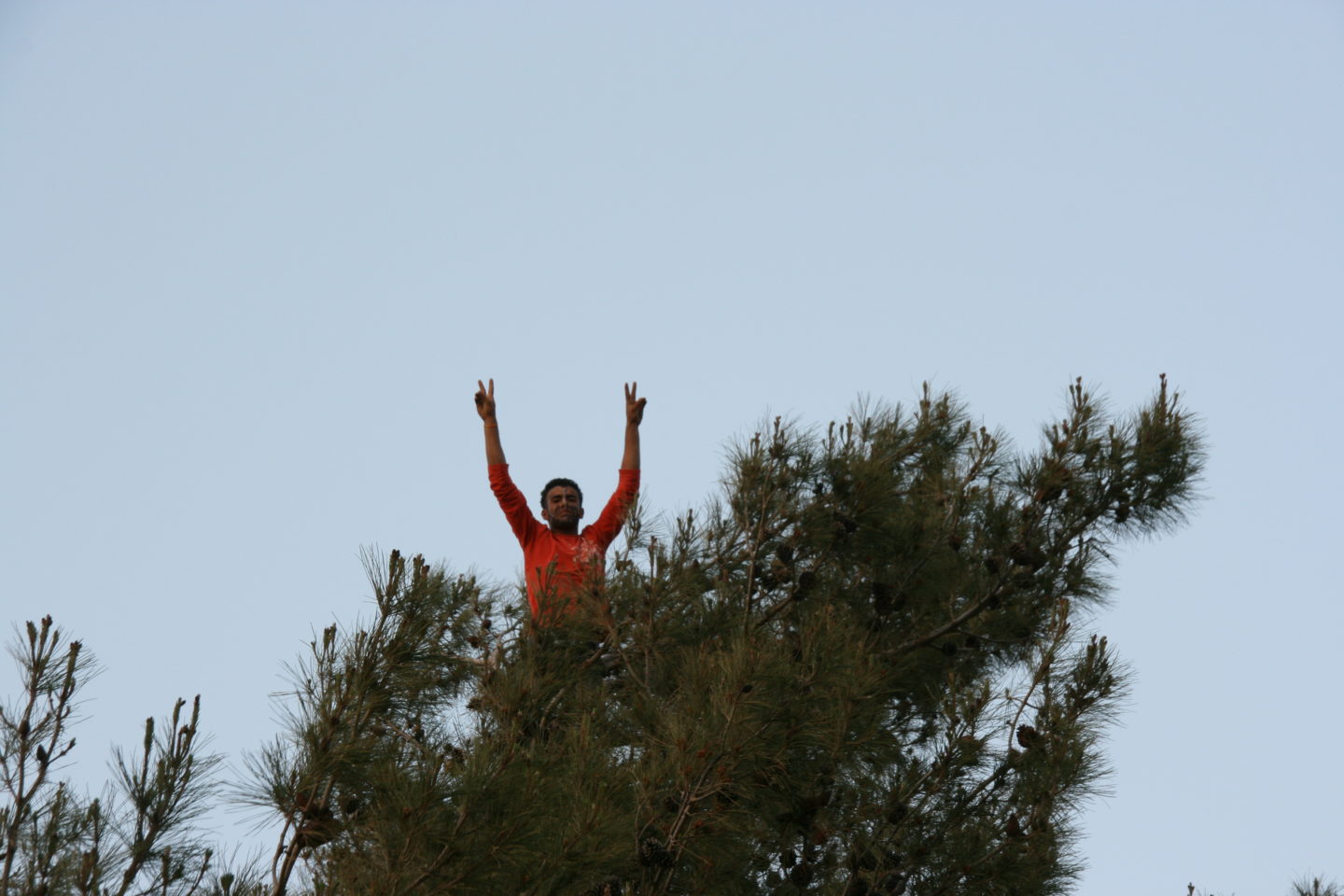
29 March – 15 May 2008, Freedom Theatre, Jenin, West Bank
___________________________________________________________________________
18 May 2008
That day, Yehuda Shaul couldn’t take us to Hebron. We were a threat to public safety. The settlers might attack us, which is why it was us, not them, that were a hazard. Yehuda decided to take the bus south of Hebron, towards Susya. 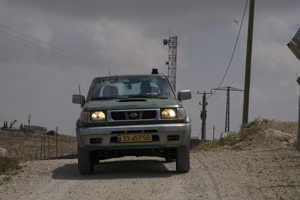 We drove down some very winding roads. First we stopped near a place that Yehuda calls Lucifer Outpost. A guy lives there who, when the apartheid had ended in south Africa, moved here. He’s converted to Judaism. Now his jeep stood in front of us. The guy got worried, reached for his mobile. Within a few minutes an Israeli police patrol appeared and it never left us again. We then went to a tiny Palestinian village – Susya, or rather what’s left of it. A couple of families, already resettled many times (the soldiers come in the night, load everyone on trucks and drive them kilometres away), live here in tents stitched together with pieces of tarpaulin, rags, blankets and plastic bags. They have their leader, Nasser, a small, lively man in a woollen cap.
We drove down some very winding roads. First we stopped near a place that Yehuda calls Lucifer Outpost. A guy lives there who, when the apartheid had ended in south Africa, moved here. He’s converted to Judaism. Now his jeep stood in front of us. The guy got worried, reached for his mobile. Within a few minutes an Israeli police patrol appeared and it never left us again. We then went to a tiny Palestinian village – Susya, or rather what’s left of it. A couple of families, already resettled many times (the soldiers come in the night, load everyone on trucks and drive them kilometres away), live here in tents stitched together with pieces of tarpaulin, rags, blankets and plastic bags. They have their leader, Nasser, a small, lively man in a woollen cap. 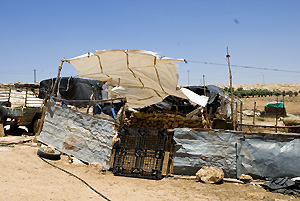 Susya is an important place. It is surrounded by a chain of Israeli settlements – Maon, Yatir, and others – and outposts. An outpost is a place surrounded by a barbed-wire fence, often with a watchtower. The military stations there. With time, the outpost develops an outer layer of trailers and turns into a settlement. This is illegal under international law. Susya is the last Palestinian village that has survived here. The resettled families have always returned. The fight for Susya is not only a fight for territory, it is also a fight, probably already lost, for the preservation of the culture of the local cave dwellers. Their culture was first described by 19th-century anthropologists. They drilled caves, inhabited them, found sources of potable water, bred cattle. But then the Israelis came with bulldozers and filled the cave entrances in with rubble. That’s how the 170-year-old culture of the cave dwellers came to an end.
Susya is an important place. It is surrounded by a chain of Israeli settlements – Maon, Yatir, and others – and outposts. An outpost is a place surrounded by a barbed-wire fence, often with a watchtower. The military stations there. With time, the outpost develops an outer layer of trailers and turns into a settlement. This is illegal under international law. Susya is the last Palestinian village that has survived here. The resettled families have always returned. The fight for Susya is not only a fight for territory, it is also a fight, probably already lost, for the preservation of the culture of the local cave dwellers. Their culture was first described by 19th-century anthropologists. They drilled caves, inhabited them, found sources of potable water, bred cattle. But then the Israelis came with bulldozers and filled the cave entrances in with rubble. That’s how the 170-year-old culture of the cave dwellers came to an end. 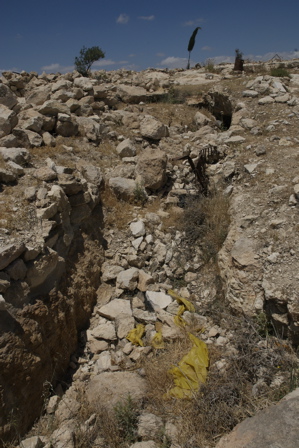 Eighty percent of water sources are controlled by the settlers. Of the two sources available to the people of Susya, one has been contaminated by the settlers, who rolled a car into it, and is good only for cattle. People have been left without enough water. The only thing they can do is go to the settlers, buy 2 cubic metres of potable water from them for 300 shekels and haul it back to the village on a donkey’s back. This year the village was saved by European activists, who brought in water for the whole, exceptionally dry, summer. Nasser showed us olive trees felled by the settlers. We came up close to see the stumps and then two figures of armed soldiers appeared on the hilltop. The people of Susya have no access to most of their fields. Illegal fences built by the settlers and the army effectively prevent them from reaching their arable land. Under an old law, dating back to Ottoman times, if someone fails to farm his land for three years in a row, they lose their right to it. The settlers are an incarnation of evil for the Israeli soldier. One, of course, who feels personally responsible in any way for what he does. When you read soldiers’ testimonies contained in the three-volume book Breaking the Silence, it turns out that the victims here are both the Palestinians, spat at, detained, ‘dried’, tortured and deprived of means of earning their living, as well as the soldiers, with their moral doubts and sense of shame and guilt. In fact, there are others who are worse than us, the soldiers say, look at the Border Police guys. If you tell a Palestinian he’ll be handed over to the Border Police, he will do whatever you want, will humiliate himself, start begging you on his knees for you not to do it. There is also the bad superior, and bad procedures, such as the ‘neighbour’ procedure, where soldiers use local civilians, who often die in the process, as cover when searching terrorist suspects’ homes. The procedure used to be called something else, but it was banned by the Israeli High Court, so its name was changed – the procedure remains the same. There are also other bad practices, such as the ‘feeling the presence’ procedure where Israeli soldiers do everything to disturb the peace of say, a night’s sleep, at a given neighbourhood. How? However. There are no rules, or rather the rules are defined by the officer in charge. Depending on his personality, he can order you to search a house in the middle of the night, or shoot in the air, or shoot at house walls… The point is for the Palestinians to be aware at all times that the army is near. Another evil is using children as human shields. In many situations. Reported to be highly effective.
Eighty percent of water sources are controlled by the settlers. Of the two sources available to the people of Susya, one has been contaminated by the settlers, who rolled a car into it, and is good only for cattle. People have been left without enough water. The only thing they can do is go to the settlers, buy 2 cubic metres of potable water from them for 300 shekels and haul it back to the village on a donkey’s back. This year the village was saved by European activists, who brought in water for the whole, exceptionally dry, summer. Nasser showed us olive trees felled by the settlers. We came up close to see the stumps and then two figures of armed soldiers appeared on the hilltop. The people of Susya have no access to most of their fields. Illegal fences built by the settlers and the army effectively prevent them from reaching their arable land. Under an old law, dating back to Ottoman times, if someone fails to farm his land for three years in a row, they lose their right to it. The settlers are an incarnation of evil for the Israeli soldier. One, of course, who feels personally responsible in any way for what he does. When you read soldiers’ testimonies contained in the three-volume book Breaking the Silence, it turns out that the victims here are both the Palestinians, spat at, detained, ‘dried’, tortured and deprived of means of earning their living, as well as the soldiers, with their moral doubts and sense of shame and guilt. In fact, there are others who are worse than us, the soldiers say, look at the Border Police guys. If you tell a Palestinian he’ll be handed over to the Border Police, he will do whatever you want, will humiliate himself, start begging you on his knees for you not to do it. There is also the bad superior, and bad procedures, such as the ‘neighbour’ procedure, where soldiers use local civilians, who often die in the process, as cover when searching terrorist suspects’ homes. The procedure used to be called something else, but it was banned by the Israeli High Court, so its name was changed – the procedure remains the same. There are also other bad practices, such as the ‘feeling the presence’ procedure where Israeli soldiers do everything to disturb the peace of say, a night’s sleep, at a given neighbourhood. How? However. There are no rules, or rather the rules are defined by the officer in charge. Depending on his personality, he can order you to search a house in the middle of the night, or shoot in the air, or shoot at house walls… The point is for the Palestinians to be aware at all times that the army is near. Another evil is using children as human shields. In many situations. Reported to be highly effective. 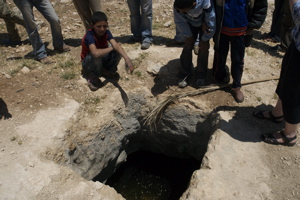 Evil is abstract, delegated onto others, you as you are always in between. You are a neutral, feeling individual, with your dilemmas, your doubts, your disgust. When I look at visitors from Europe treating the state of Israel, evil embodied in a state abstraction, with similar disgust, I start to have doubts. I remember a German filmmaker in Jenin waiting for weeks for his main character, Ahmad, to appear. He said he didn’t understand why Ahmad wasn’t turning up – after all, he was here to help the Palestinian cause! I looked at him, just as I looked at myself, and I thought that it is we ourselves who are responsible for what has happened, and is still happening, in Israel. That it’s great that we want to help – but whom are we really helping? That Israel is our project, after all, an effect of Europe’s colonial ambitions and a conviction that our way of living is better than anyone else’s. That living in a sloping-roof house is better than living in a rock cave.
Evil is abstract, delegated onto others, you as you are always in between. You are a neutral, feeling individual, with your dilemmas, your doubts, your disgust. When I look at visitors from Europe treating the state of Israel, evil embodied in a state abstraction, with similar disgust, I start to have doubts. I remember a German filmmaker in Jenin waiting for weeks for his main character, Ahmad, to appear. He said he didn’t understand why Ahmad wasn’t turning up – after all, he was here to help the Palestinian cause! I looked at him, just as I looked at myself, and I thought that it is we ourselves who are responsible for what has happened, and is still happening, in Israel. That it’s great that we want to help – but whom are we really helping? That Israel is our project, after all, an effect of Europe’s colonial ambitions and a conviction that our way of living is better than anyone else’s. That living in a sloping-roof house is better than living in a rock cave. 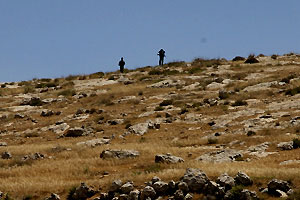 It is us, in Poland, in Germany, who got rid of Jews. A policy of extermination, conducted in a more or less radical manner, is something we know perfectly well. Amos Oz: why has Israel not developed into the world’s most egalitarian and creative social democracy? I’d say that one of the main reasons was the mass immigration of Holocaust survivors, Middle Eastern Jews, and non-socialistic or anti-socialistic Zionists desiring ‘normalisation’. The Holocaust had convinced many Jews that the cruel game of the nations has to played according to its cruel laws: statehood, military establishment, and a pessimistic conception of the use of military force. At the same time, some of them wanted Israel to become a replica of the pre-war bourgeois Central Europe, with its red tile roofs and good manners, with Frau Direktor and Herr Doktor, Gemütlichkeit and Bavarian cream – Franz Joseph Vienna transplanted to the Holy Land. 13 May 2008 This is the last part of my trip. Outside the window of my small room bangers are exploding. It could seem that grownups are playing like children, but it’s simply the only thing they can do to celebrate a sad occasion: today is the sixtieth anniversary of the Nakba, the Palestinian catastrophe of 1948. The crowd by the Damascene Gate sways. There are a lot of soldiers and police around. When whistling and applause starts, the soldiers climb on one another’s backs and grab their M16s.
It is us, in Poland, in Germany, who got rid of Jews. A policy of extermination, conducted in a more or less radical manner, is something we know perfectly well. Amos Oz: why has Israel not developed into the world’s most egalitarian and creative social democracy? I’d say that one of the main reasons was the mass immigration of Holocaust survivors, Middle Eastern Jews, and non-socialistic or anti-socialistic Zionists desiring ‘normalisation’. The Holocaust had convinced many Jews that the cruel game of the nations has to played according to its cruel laws: statehood, military establishment, and a pessimistic conception of the use of military force. At the same time, some of them wanted Israel to become a replica of the pre-war bourgeois Central Europe, with its red tile roofs and good manners, with Frau Direktor and Herr Doktor, Gemütlichkeit and Bavarian cream – Franz Joseph Vienna transplanted to the Holy Land. 13 May 2008 This is the last part of my trip. Outside the window of my small room bangers are exploding. It could seem that grownups are playing like children, but it’s simply the only thing they can do to celebrate a sad occasion: today is the sixtieth anniversary of the Nakba, the Palestinian catastrophe of 1948. The crowd by the Damascene Gate sways. There are a lot of soldiers and police around. When whistling and applause starts, the soldiers climb on one another’s backs and grab their M16s.  Three years after the end of WWII, the Zionists resettled 700,000 people to refugee camps, which with time became almost a model of the contemporary ghetto. The colonisation of Palestine has been carried out to this day in keeping with the well-tried methods of the apartheid. There is no right of return for the resettled Palestinians. When they hear the words ‘right to return’, even the most left-leaning Israelis react with a hard no. In fact, as I have realised after nearly two months in Israel, here ‘left-leaning’ means simply ‘not far right’, ‘not ultra-nationalist’. Soldiers in Hebron scorn other soldiers who do not participate eagerly in cruel practices against the Palestinians and call them ‘leftie-softie’. I have the impression that sixty years later the tragedy of the Nakba remains as strongly felt on both sides of the barricade. I’m not trying to make an equation between the victims and the perpetrators. Tragedies destroy both sides. And loud celebrations that effectively eliminate the Palestinian issue from the narrative won’t help here. It is enough to walk around some Israeli town, best a small one like Holon (I recently got lost there and got to know many strange streets), or to go any town on the West Bank… It is something that is present in the gestures, in the gazes. On the one hand, desperation, despair, chaos, being used to humiliation, demoralisation, simply decay – all that is present in Palestine, in the way these people walk, talk, fear, laugh.
Three years after the end of WWII, the Zionists resettled 700,000 people to refugee camps, which with time became almost a model of the contemporary ghetto. The colonisation of Palestine has been carried out to this day in keeping with the well-tried methods of the apartheid. There is no right of return for the resettled Palestinians. When they hear the words ‘right to return’, even the most left-leaning Israelis react with a hard no. In fact, as I have realised after nearly two months in Israel, here ‘left-leaning’ means simply ‘not far right’, ‘not ultra-nationalist’. Soldiers in Hebron scorn other soldiers who do not participate eagerly in cruel practices against the Palestinians and call them ‘leftie-softie’. I have the impression that sixty years later the tragedy of the Nakba remains as strongly felt on both sides of the barricade. I’m not trying to make an equation between the victims and the perpetrators. Tragedies destroy both sides. And loud celebrations that effectively eliminate the Palestinian issue from the narrative won’t help here. It is enough to walk around some Israeli town, best a small one like Holon (I recently got lost there and got to know many strange streets), or to go any town on the West Bank… It is something that is present in the gestures, in the gazes. On the one hand, desperation, despair, chaos, being used to humiliation, demoralisation, simply decay – all that is present in Palestine, in the way these people walk, talk, fear, laugh. 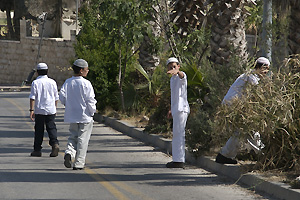 In the gestures, in the way the Israelis talk and look, there is right and grievance, both cemented by trauma. Their own, of course. If you want to understand anything here, you must not ignore this – comprehension-eluding, paradoxically – but important element – body language. *** ‘It’s just so that a higher culture squeezes out a lower one. Take Rome for example…’ (from a conversation with an elderly Israeli lady) *** ‘I don’t want to feel guilty for what is happening in the West Bank. Why should I feel guilty? I don’t want to feel guilty.’ (from a conversation with a young Israeli woman) *** From interviews with soldiers serving in Hebron featured in the book Breaking the Silence. Soldiers Speak Out About Their Service in Hebron: *** ‘Now no one can say we don’t take care of these animals.” Paramedic Referring to a 12-year old run over by a vehicle of the Jewish settlement… and taking it to the ambulance. ***
In the gestures, in the way the Israelis talk and look, there is right and grievance, both cemented by trauma. Their own, of course. If you want to understand anything here, you must not ignore this – comprehension-eluding, paradoxically – but important element – body language. *** ‘It’s just so that a higher culture squeezes out a lower one. Take Rome for example…’ (from a conversation with an elderly Israeli lady) *** ‘I don’t want to feel guilty for what is happening in the West Bank. Why should I feel guilty? I don’t want to feel guilty.’ (from a conversation with a young Israeli woman) *** From interviews with soldiers serving in Hebron featured in the book Breaking the Silence. Soldiers Speak Out About Their Service in Hebron: *** ‘Now no one can say we don’t take care of these animals.” Paramedic Referring to a 12-year old run over by a vehicle of the Jewish settlement… and taking it to the ambulance. *** 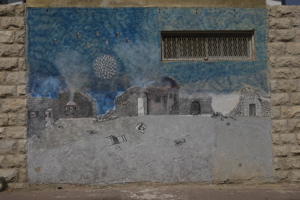 The great thing about Hebron, the thing that gets to you more than anything else, is the total indifference it instills in you. It’s hard to describe the kind of enormous sea of indifference you’re swimming in while you’re there. It’s possible to explain a little, through little anecdotes, but it’s not enough to make it really clear. One story is about a little kid, a boy of about six, who passed by me at my post. We were at… He said to me: “Soldier, listen, don’t get annoyed, don’t try and stop me, I’m going out to kill some Arabs.” I look at the kid and don’t quite understand exactly what I’m supposed to do. So he says: “First, I’m going to buy a popsicle at Gotnik’s”—that’s their grocery store, “then I’m going to kill some Arabs.” I had nothing to say to him. Nothing. I went completely blank. And that’s not such a simple thing… that a city, that such an experience can turn someone who was an educator, a counselor, who believed in education, who believed in talking to people, even if their opinions were different. But I had nothing to say to a kid like that. There’s nothing to say to him. *** In one of our conversations with the Border Police in Hebron, two of them were bragging about how much they liked to take a Palestinian whom they caught throwing stones or just throwing a word at them, or looking at them the wrong way. They’d put him into an armored jeep and then hit him with the spark-mufflers of their weapons in the chest or the stomach or the neck. Then they’d bet how fast they could take the turn in the road where they’d throw him out of the armored jeep. If you ask me, then yes, it really bothered me, but what could I do about it? Q: You know that the Border Police did this to someone afterwards and he was killed. They murdered someone. That’s very sad. And, so? Q: Did you recognize any of the murderers, the guys who are standing trial now? No. I didn’t recognize anyone. I don’t know them. I just heard ‘em talking. ***
The great thing about Hebron, the thing that gets to you more than anything else, is the total indifference it instills in you. It’s hard to describe the kind of enormous sea of indifference you’re swimming in while you’re there. It’s possible to explain a little, through little anecdotes, but it’s not enough to make it really clear. One story is about a little kid, a boy of about six, who passed by me at my post. We were at… He said to me: “Soldier, listen, don’t get annoyed, don’t try and stop me, I’m going out to kill some Arabs.” I look at the kid and don’t quite understand exactly what I’m supposed to do. So he says: “First, I’m going to buy a popsicle at Gotnik’s”—that’s their grocery store, “then I’m going to kill some Arabs.” I had nothing to say to him. Nothing. I went completely blank. And that’s not such a simple thing… that a city, that such an experience can turn someone who was an educator, a counselor, who believed in education, who believed in talking to people, even if their opinions were different. But I had nothing to say to a kid like that. There’s nothing to say to him. *** In one of our conversations with the Border Police in Hebron, two of them were bragging about how much they liked to take a Palestinian whom they caught throwing stones or just throwing a word at them, or looking at them the wrong way. They’d put him into an armored jeep and then hit him with the spark-mufflers of their weapons in the chest or the stomach or the neck. Then they’d bet how fast they could take the turn in the road where they’d throw him out of the armored jeep. If you ask me, then yes, it really bothered me, but what could I do about it? Q: You know that the Border Police did this to someone afterwards and he was killed. They murdered someone. That’s very sad. And, so? Q: Did you recognize any of the murderers, the guys who are standing trial now? No. I didn’t recognize anyone. I don’t know them. I just heard ‘em talking. *** 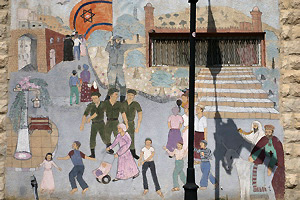 I’d come home, then go back to Hebron and feel as though I’d gone abroad, really… as though in one go I simply cut to a totally different place. Whatever I used to call democracy here, would simply vanish in Hebron. Jews did as they pleased there, there were no laws. No traffic laws. Nothing. Whatever they do there is done in the name of religion, and anything goes – breaking into shops, that’s allowed… As a soldier I had a real problem because I come from a family that believes in values, in morals. I was in a youth movement. I knew about democracy, had learned about it in school. And I find myself in an army post, having to say to people: “Listen, you can’t get through here now.” “Why not?” “Because these are the orders now”… Simple. I didn’t really have any good reasons to give them, and it wouldn’t matter what I’d say, they were still prevented from moving on. Or entering someone’s house and having to say: “Okay, now I want all the children to go into one room, I want to search your home”. I think that if this happened the other way around, I don’t know what I’d do. Really. I’d go crazy if my home would be entered like that. I tried to imagine my parents, my family, what would they actually do if people with guns would enter a home with small children, 4-5 years old, point weapons at them and say: “Okay, everybody move!” I had a really hard time with this, with sitting at the post and telling people “You cannot pass”, or “Move on!” Or when we arrested people who had broken curfew. What does that mean, breaking the curfew? It just means they went out to do some shopping, breaking curfew. So the platoon commander would say: “Okay, now everyone move over to the side.” After making them stand on the side, he’d tell us to “dry them up for a couple of hours”. I said: “What do we do with them for hours?” “Just make them sit here.” *** I said, “Listen, what’s the deal, how long do you want to detain him for?” He said, “Listen, you can do whatever you want, whatever you feel like doing. If you feel there’s a problem with what he’s done, if you feel something’s wrong, even the slightest thing, you can detain him for as long as you want.” *** I was ashamed of myself the day I realized that I simply enjoy the feeling of power. I don’t believe in it: I think this is not the way to do anything to anyone, surely not to someone who has done nothing to you, but you can’t help but enjoy it. People do what you tell them. You know it’s because you carry a weapon. Knowing that if you didn’t have it, and if your fellow soldiers weren’t beside you, they would jump on you, beat the shit out of you, and stab you to death—you begin to enjoy it. Not merely enjoy it, you need it. *** Those were excerpts from the interviews collected in the three volumes of Breaking the Silence. You can find them here: http://www.shovrimshtika.org/publications_e.asp. And that’s it for today. It’s completely dark outside. 10 May 2008 Two days under the sign of Hebron.
I’d come home, then go back to Hebron and feel as though I’d gone abroad, really… as though in one go I simply cut to a totally different place. Whatever I used to call democracy here, would simply vanish in Hebron. Jews did as they pleased there, there were no laws. No traffic laws. Nothing. Whatever they do there is done in the name of religion, and anything goes – breaking into shops, that’s allowed… As a soldier I had a real problem because I come from a family that believes in values, in morals. I was in a youth movement. I knew about democracy, had learned about it in school. And I find myself in an army post, having to say to people: “Listen, you can’t get through here now.” “Why not?” “Because these are the orders now”… Simple. I didn’t really have any good reasons to give them, and it wouldn’t matter what I’d say, they were still prevented from moving on. Or entering someone’s house and having to say: “Okay, now I want all the children to go into one room, I want to search your home”. I think that if this happened the other way around, I don’t know what I’d do. Really. I’d go crazy if my home would be entered like that. I tried to imagine my parents, my family, what would they actually do if people with guns would enter a home with small children, 4-5 years old, point weapons at them and say: “Okay, everybody move!” I had a really hard time with this, with sitting at the post and telling people “You cannot pass”, or “Move on!” Or when we arrested people who had broken curfew. What does that mean, breaking the curfew? It just means they went out to do some shopping, breaking curfew. So the platoon commander would say: “Okay, now everyone move over to the side.” After making them stand on the side, he’d tell us to “dry them up for a couple of hours”. I said: “What do we do with them for hours?” “Just make them sit here.” *** I said, “Listen, what’s the deal, how long do you want to detain him for?” He said, “Listen, you can do whatever you want, whatever you feel like doing. If you feel there’s a problem with what he’s done, if you feel something’s wrong, even the slightest thing, you can detain him for as long as you want.” *** I was ashamed of myself the day I realized that I simply enjoy the feeling of power. I don’t believe in it: I think this is not the way to do anything to anyone, surely not to someone who has done nothing to you, but you can’t help but enjoy it. People do what you tell them. You know it’s because you carry a weapon. Knowing that if you didn’t have it, and if your fellow soldiers weren’t beside you, they would jump on you, beat the shit out of you, and stab you to death—you begin to enjoy it. Not merely enjoy it, you need it. *** Those were excerpts from the interviews collected in the three volumes of Breaking the Silence. You can find them here: http://www.shovrimshtika.org/publications_e.asp. And that’s it for today. It’s completely dark outside. 10 May 2008 Two days under the sign of Hebron. 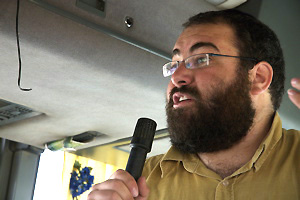 I had just come back, very tired, I don’t know why. I lay on my bed, covered myself with a colourful blanket, and for two hours listened to music, almost dozing off. Music from here. I seldom do it. I can’t live without sounds here. Jenin, Tulkarem, Ramallah, Hebron, Susya, Yatta, Bethlehem, Aroup, everything is a sequence of sounds here: shouts, car horns, conversations, the West Bank is very noisy. I cooked two corn cobs for dinner and sat in the hostel’s tea/coffee room. A guy sat down next to me who works here, a Jordanian who spent his life in California. I asked him why he came back. Divorce, nervous breakdown, conversion, Jesus Christ. There is something very beautiful about this man, a right kind of calmness, almost deadly. His eyes are always half closed. He said that when he was been trying to overcome his depression, he read. The Bible, all kinds of books. He read without a break, eight hours a day. He reads here too. He sits in an armchair, at the top of the stairs, right above the greengrocery in the gate, amid the strong scent of peppermint, apples, aubergines, and cucumbers. And he reads. It seems to me I regularly see at least two Jews waiting all day for the Messiah to appear, near the Old Town gates.
I had just come back, very tired, I don’t know why. I lay on my bed, covered myself with a colourful blanket, and for two hours listened to music, almost dozing off. Music from here. I seldom do it. I can’t live without sounds here. Jenin, Tulkarem, Ramallah, Hebron, Susya, Yatta, Bethlehem, Aroup, everything is a sequence of sounds here: shouts, car horns, conversations, the West Bank is very noisy. I cooked two corn cobs for dinner and sat in the hostel’s tea/coffee room. A guy sat down next to me who works here, a Jordanian who spent his life in California. I asked him why he came back. Divorce, nervous breakdown, conversion, Jesus Christ. There is something very beautiful about this man, a right kind of calmness, almost deadly. His eyes are always half closed. He said that when he was been trying to overcome his depression, he read. The Bible, all kinds of books. He read without a break, eight hours a day. He reads here too. He sits in an armchair, at the top of the stairs, right above the greengrocery in the gate, amid the strong scent of peppermint, apples, aubergines, and cucumbers. And he reads. It seems to me I regularly see at least two Jews waiting all day for the Messiah to appear, near the Old Town gates. 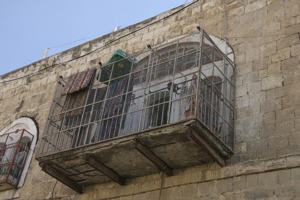 A soldier in Hebron came up to me today and asked, ‘What’s your religion?’ Hebron began very early in the morning today. At 8.30 a.m. I stood across the street from Jerusalem’s Central Bus Station, waiting for a bus with a group of Canadians, Britons, a gay couple from Sweden, and a very elderly couple from Israel. They were so moving I couldn’t tear my eyes off them. Very elderly, around eighty, beautiful, when they said something to me, the gentleman always asked, ‘Deutsch or English?’ He would then forget my reply, start speaking German to me, his wife reprimanded him, and five minutes later he asked again, ‘Deutsch or English?’ It was an excursion organised by people from Breaking the Silence – Shovrim Shtika. Once on the bus, we were greeted by Yehuda Shaul, a former soldier.
A soldier in Hebron came up to me today and asked, ‘What’s your religion?’ Hebron began very early in the morning today. At 8.30 a.m. I stood across the street from Jerusalem’s Central Bus Station, waiting for a bus with a group of Canadians, Britons, a gay couple from Sweden, and a very elderly couple from Israel. They were so moving I couldn’t tear my eyes off them. Very elderly, around eighty, beautiful, when they said something to me, the gentleman always asked, ‘Deutsch or English?’ He would then forget my reply, start speaking German to me, his wife reprimanded him, and five minutes later he asked again, ‘Deutsch or English?’ It was an excursion organised by people from Breaking the Silence – Shovrim Shtika. Once on the bus, we were greeted by Yehuda Shaul, a former soldier. 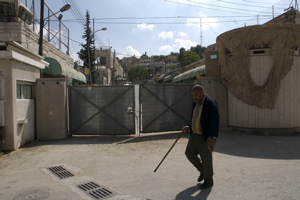 Yehuda is one of the founders of the organisation – a group of former Israeli Army soldiers who have decided to talk about what the Israeli occupation really is. What it means to man a checkpoint for eight hours. What operation ‘friend’ means. What the tactic of ‘being present’ means in practice. How the Israeli army uses Palestinian children to avoid trouble when on patrol. Yehuda first told us how come that Breaking the Silence exists at all. It all started with a 2004 photo exhibition in which former soldiers, freshly back from a round in Hebron, wanted to show their everyday experiences in the army. Not the most shocking pictures. Rather those that were to simply inform about a reality so common for the soldiers that at some point they stopped paying attention to it. The impulse for organising the exhibit came from an inability to communicate those experiences in any other way, an inability to talk about it, a lack of proper language, of courage. Or perhaps above all the fact that the Israeli public doesn’t want to know. The mechanisms of repression are extremely effective. Such as a simple psychological method – the celebration of one’s own trauma. The Israeli public was shocked by the exhibition. The soldiers were taken to court. For what? For carrying out their orders.
Yehuda is one of the founders of the organisation – a group of former Israeli Army soldiers who have decided to talk about what the Israeli occupation really is. What it means to man a checkpoint for eight hours. What operation ‘friend’ means. What the tactic of ‘being present’ means in practice. How the Israeli army uses Palestinian children to avoid trouble when on patrol. Yehuda first told us how come that Breaking the Silence exists at all. It all started with a 2004 photo exhibition in which former soldiers, freshly back from a round in Hebron, wanted to show their everyday experiences in the army. Not the most shocking pictures. Rather those that were to simply inform about a reality so common for the soldiers that at some point they stopped paying attention to it. The impulse for organising the exhibit came from an inability to communicate those experiences in any other way, an inability to talk about it, a lack of proper language, of courage. Or perhaps above all the fact that the Israeli public doesn’t want to know. The mechanisms of repression are extremely effective. Such as a simple psychological method – the celebration of one’s own trauma. The Israeli public was shocked by the exhibition. The soldiers were taken to court. For what? For carrying out their orders.  Yehuda said something very important. ‘As a company commander, three, four months before discharge, I didn’t have much to do. So I sat and thought about what would happen to me. And I suddenly realised that I had lost all the arguments justifying what I had been doing for the last three years.’ Yehuda is a big, fattyish, strong guy. The kind of guy you’d gladly spend some time and go to a pub with. He has a lot of channelled energy in himself, a great deal of energy. And a kind of shadow. Hebron is the only Palestinian city in the West Bank with Jewish settlements in its very heart. In the light of international law, the settlements are illegal. In 1968, a year after the end of the Six Day War, when Israel gained control of Hebron, settlers came here and have never left the city since. The city saw two massacres. In 1929, Moslems killed 69 Jews and wounded a further 60. In 1994, Baruch Goldstein opened fire at Moslems praying in the Ibrahimi Mosque, killing 29 people. In 1997, in order to improve the safety of several hundred (600-800) settlers, the city was divided into two sectors – H1 and H2. The settlements are located in H2, where the Old Town, the Patriarch Tomb, and all that makes Hebron what it is are located. Some 30,000 Arabs live, or rather try to live, there, the remaining 120,000 in H2.
Yehuda said something very important. ‘As a company commander, three, four months before discharge, I didn’t have much to do. So I sat and thought about what would happen to me. And I suddenly realised that I had lost all the arguments justifying what I had been doing for the last three years.’ Yehuda is a big, fattyish, strong guy. The kind of guy you’d gladly spend some time and go to a pub with. He has a lot of channelled energy in himself, a great deal of energy. And a kind of shadow. Hebron is the only Palestinian city in the West Bank with Jewish settlements in its very heart. In the light of international law, the settlements are illegal. In 1968, a year after the end of the Six Day War, when Israel gained control of Hebron, settlers came here and have never left the city since. The city saw two massacres. In 1929, Moslems killed 69 Jews and wounded a further 60. In 1994, Baruch Goldstein opened fire at Moslems praying in the Ibrahimi Mosque, killing 29 people. In 1997, in order to improve the safety of several hundred (600-800) settlers, the city was divided into two sectors – H1 and H2. The settlements are located in H2, where the Old Town, the Patriarch Tomb, and all that makes Hebron what it is are located. Some 30,000 Arabs live, or rather try to live, there, the remaining 120,000 in H2. 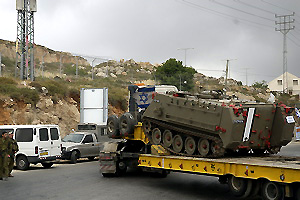 In H2, Palestinian families are harassed on a daily basis by the settlers, who throw trash, excrements, disposable diapers, and all kinds of waste into their courtyards and onto the roofs of their houses. Jewish mamas teach their children how to throw stones at Arabs and tourists. The settlers’ violence verges on the hysterical. The Army doesn’t react. H2 is an apartheid system of roads – there are roads on which the Palestinians aren’t allowed at all, there are those where they can’t drive their cars, and those where they can’t open businesses. There also combinations of the three categories. The most tragic example is Al-Shuhada Street. A Jewish enclave closely guarded by an internal checkpoint. Just a couple of Palestinian families have endured there. Until recently they weren’t allowed to use the street, so their only connection with the world was the roof. The ban was recently lifted, but Yehuda says there are still streets that the Palestinians are not allowed to use at all. Such houses are small prisons. Their windows, doors, and balconies are barred, because the settlers smash the windows and pry open the doors almost every day. The Arabic Hebron is dying. Street after street is being crammed with massive concrete apartment blocks, shop after shop is being closed down. A ring of Jewish settlements is growing around the city. Four in ten Arab houses in downtown Hebron have been deserted, close to eight in ten Arab businesses – closed down.
In H2, Palestinian families are harassed on a daily basis by the settlers, who throw trash, excrements, disposable diapers, and all kinds of waste into their courtyards and onto the roofs of their houses. Jewish mamas teach their children how to throw stones at Arabs and tourists. The settlers’ violence verges on the hysterical. The Army doesn’t react. H2 is an apartheid system of roads – there are roads on which the Palestinians aren’t allowed at all, there are those where they can’t drive their cars, and those where they can’t open businesses. There also combinations of the three categories. The most tragic example is Al-Shuhada Street. A Jewish enclave closely guarded by an internal checkpoint. Just a couple of Palestinian families have endured there. Until recently they weren’t allowed to use the street, so their only connection with the world was the roof. The ban was recently lifted, but Yehuda says there are still streets that the Palestinians are not allowed to use at all. Such houses are small prisons. Their windows, doors, and balconies are barred, because the settlers smash the windows and pry open the doors almost every day. The Arabic Hebron is dying. Street after street is being crammed with massive concrete apartment blocks, shop after shop is being closed down. A ring of Jewish settlements is growing around the city. Four in ten Arab houses in downtown Hebron have been deserted, close to eight in ten Arab businesses – closed down. 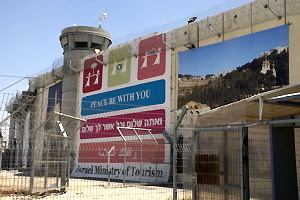 Yehuda had managed to tell us all that before we arrived at the checkpoint and were stopped by the settlers, the police, the military, and the settlements’ own security agents. The barrier closed in front of the bus. Everyone took out their cameras. Yehuda filmed the policemen and was filmed by them, as well as by the settlers hurling abuse at him. Hour-long negotiations began, Yehuda’s nervous phone calls to lawyers, shouting, tension. Finally a decision was made – we can cross the checkpoint provided no one leaves the bus. If we do, we’ll be arrested. Okay. We decided to go, leave the bus and be arrested. The bus moved forward. The gate closed again, no one on the other side expected the decision. We stepped out and were immediately surrounded by settlers with a camera, shouting at us in Hebrew. None of us understood a word. Yehuda summarised it for us – they told him he was piece of shit and that Hebron was Jewish. His face was not a pleasant sight – tightened like a mask. When we were standing like that, suddenly a platform trailer appeared with a tank, a genuine, brand-new tank flying a big Israeli flag. No, they didn’t have the right to arrest us. But that’s how the execution of rights looks like in Israel. Military law means that decisions are made on the spot by the army, the given unit on site. Afterwards you can pursue your rights in court. We went elsewhere, but I’ll tell the story another time. Also about ‘operation friend,’ the tactic of ‘being present’ in Hebron, and how the army uses Palestinian children. Next morning I packed my backpack, went to the tiny Palestinian bus station and took a ‘service’ to a checkpoint near Bethlehem. My father has this saying, rather disgusting: if they throw you out through the door, come back through the window. The moment had obviously arrived on that day.
Yehuda had managed to tell us all that before we arrived at the checkpoint and were stopped by the settlers, the police, the military, and the settlements’ own security agents. The barrier closed in front of the bus. Everyone took out their cameras. Yehuda filmed the policemen and was filmed by them, as well as by the settlers hurling abuse at him. Hour-long negotiations began, Yehuda’s nervous phone calls to lawyers, shouting, tension. Finally a decision was made – we can cross the checkpoint provided no one leaves the bus. If we do, we’ll be arrested. Okay. We decided to go, leave the bus and be arrested. The bus moved forward. The gate closed again, no one on the other side expected the decision. We stepped out and were immediately surrounded by settlers with a camera, shouting at us in Hebrew. None of us understood a word. Yehuda summarised it for us – they told him he was piece of shit and that Hebron was Jewish. His face was not a pleasant sight – tightened like a mask. When we were standing like that, suddenly a platform trailer appeared with a tank, a genuine, brand-new tank flying a big Israeli flag. No, they didn’t have the right to arrest us. But that’s how the execution of rights looks like in Israel. Military law means that decisions are made on the spot by the army, the given unit on site. Afterwards you can pursue your rights in court. We went elsewhere, but I’ll tell the story another time. Also about ‘operation friend,’ the tactic of ‘being present’ in Hebron, and how the army uses Palestinian children. Next morning I packed my backpack, went to the tiny Palestinian bus station and took a ‘service’ to a checkpoint near Bethlehem. My father has this saying, rather disgusting: if they throw you out through the door, come back through the window. The moment had obviously arrived on that day.  I passed through the biggest checkpoint I had ever seen. Meanders of barriers, tonnes of concrete, steel turnstiles, bullet-proof windows, barrier systems. And the wall. This fragment of the wall is most spectacular. It seems taller than elsewhere, though it probably isn’t. So I passed through this labyrinth and on the other side Banksy’s mocking graffiti pictures welcomed me. As big as the wall and very cool. The second surprise were the smiles of the Palestinian taxi drivers waiting for schlemiels like me. Because on shabbat, even though it’s a Jewish holiday, the service to the checkpoint on the other side of the wall is closed. I started to negotiate.
I passed through the biggest checkpoint I had ever seen. Meanders of barriers, tonnes of concrete, steel turnstiles, bullet-proof windows, barrier systems. And the wall. This fragment of the wall is most spectacular. It seems taller than elsewhere, though it probably isn’t. So I passed through this labyrinth and on the other side Banksy’s mocking graffiti pictures welcomed me. As big as the wall and very cool. The second surprise were the smiles of the Palestinian taxi drivers waiting for schlemiels like me. Because on shabbat, even though it’s a Jewish holiday, the service to the checkpoint on the other side of the wall is closed. I started to negotiate. 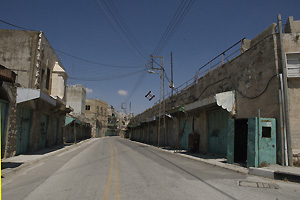 ‘Two hundred shekels. Two ways – to Hebron and back.’ ‘No way.’ I decided to play it tough. ‘You know how much gasoline…’ ‘No way. From Ramallah to Jenin is two hours and I paid 200. How long does it take to go to Hebron? 30 minutes?’ – I understated the price to Jenin, but I knew that the very word ‘Jenin’ was like a magical key. I was right. ‘Okay, one hundred and fifty and I can wait for you two hours in Hebron.’ I looked at the guy and I liked him. ‘Okay. Seventy five one way. Alright.’ I made friends with him on the way. His name was Tareq. He was all happy when it turned out I knew about Aroup Refugee Camp, which we passed on the way.
‘Two hundred shekels. Two ways – to Hebron and back.’ ‘No way.’ I decided to play it tough. ‘You know how much gasoline…’ ‘No way. From Ramallah to Jenin is two hours and I paid 200. How long does it take to go to Hebron? 30 minutes?’ – I understated the price to Jenin, but I knew that the very word ‘Jenin’ was like a magical key. I was right. ‘Okay, one hundred and fifty and I can wait for you two hours in Hebron.’ I looked at the guy and I liked him. ‘Okay. Seventy five one way. Alright.’ I made friends with him on the way. His name was Tareq. He was all happy when it turned out I knew about Aroup Refugee Camp, which we passed on the way. 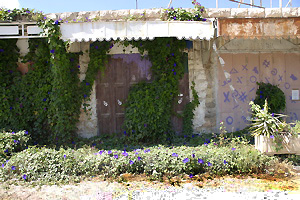 So we wandered around Hebron together. He took me to the mosque with the graves of Abraham, Sarah and Isaac. Then we went towards the Jewish enclave. Barriers, turnstiles, concrete. Two soldiers for a start. One had a very tired face. He held his M16 as if he was holding a child, but that child was obviously an immense burden for him. Questions, questions. Poland, no, no press. Okay, go. We keep walking, a dead town, the Arab shops boarded up, more concrete barriers, watchtowers, camouflage nets. A battlefield. Not a person in sight. I suddenly burst out laughing. In front of the closed gates of the post-Arab shops flowers had been planted, some kind of climbing plants, which had already managed to cover several gates. How pretty and aesthetic. Obviously the inhabitants could not bear the sight of emptiness. Suddenly a commotion. The police, the military. Tareq has to present his ID. They say Palestinians aren’t allowed here. Okay, but we had been let through, I say. An unpleasant situation, I suddenly got frightened they’d arrest him. They sent the poor guy with a tired face that had let us through for us. Escorted by the M16 we walked back.
So we wandered around Hebron together. He took me to the mosque with the graves of Abraham, Sarah and Isaac. Then we went towards the Jewish enclave. Barriers, turnstiles, concrete. Two soldiers for a start. One had a very tired face. He held his M16 as if he was holding a child, but that child was obviously an immense burden for him. Questions, questions. Poland, no, no press. Okay, go. We keep walking, a dead town, the Arab shops boarded up, more concrete barriers, watchtowers, camouflage nets. A battlefield. Not a person in sight. I suddenly burst out laughing. In front of the closed gates of the post-Arab shops flowers had been planted, some kind of climbing plants, which had already managed to cover several gates. How pretty and aesthetic. Obviously the inhabitants could not bear the sight of emptiness. Suddenly a commotion. The police, the military. Tareq has to present his ID. They say Palestinians aren’t allowed here. Okay, but we had been let through, I say. An unpleasant situation, I suddenly got frightened they’d arrest him. They sent the poor guy with a tired face that had let us through for us. Escorted by the M16 we walked back. 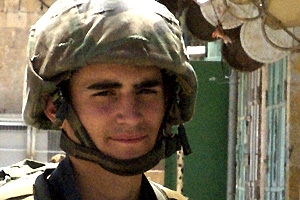 ‘How many setters live here? I asked even though I knew the answer. ‘Seven hundred or so.’ Silence. Then he asks. ‘How many Palestinians?’ ‘150,000-160,000.; ‘So you see.’ ‘I see.’ ‘Must be very hard to serve here.’ ‘Terribly hard.’ He lowered his head.
‘How many setters live here? I asked even though I knew the answer. ‘Seven hundred or so.’ Silence. Then he asks. ‘How many Palestinians?’ ‘150,000-160,000.; ‘So you see.’ ‘I see.’ ‘Must be very hard to serve here.’ ‘Terribly hard.’ He lowered his head.  He was just a kid with a light face. It was clear it all hurt him very much. If he could, he’d be screaming. I entered the next Jewish enclave alone – it was the famous Al-Shuhada Street. Stones flew towards me. The soldiers stood nearby. They didn’t react. I need a break from this torrent of misfortune because I’m losing my ability to write. I need to leave here. May 7, 2008
He was just a kid with a light face. It was clear it all hurt him very much. If he could, he’d be screaming. I entered the next Jewish enclave alone – it was the famous Al-Shuhada Street. Stones flew towards me. The soldiers stood nearby. They didn’t react. I need a break from this torrent of misfortune because I’m losing my ability to write. I need to leave here. May 7, 2008 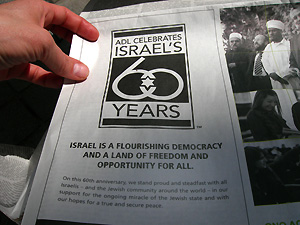 Jerusalem is all fireworks today – it’s Independence Day. I’m sitting at Palm Hostel, explosions outside my window, listening to Wissam Murad. A guy from Jerusalem. Great music. The rhythm is set by firecrackers and bangers though… More on that in a moment. B’Tselem sent me an official apology. They must have thought hard for two days if they wrote, ‘The matter seemed to have created a small internal debate – it is a bit of a unique case for us because most of the footage requests we get are more TV, news oriented, with a less clear political purpose.’ Put shortly, I’m returning there next week. Great. I was at the ICAHD today [Israeli Committee Against House Demolitions]. The ICAHD deals with all cases of house demolitions. And it has a lot to deal with – since 1967 the Israelis have razed to the ground 18,000 Palestinian houses, of which the ICAHD activists have managed to rebuild 106 over the last 10 years. That’s not much. Especially that the bulldozers sometimes demolish again the houses that have been rebuilt with the joint effort of the ICAHD activists and voluntaries. It’s hard to fight the official policy of your own state, one of the guidelines of which is to reduce the number of Palestinians living in areas earmarked for Jewish settlement or in their vicinity. Today, as I’ve read, there are 5,499,000 Jews in Israel and 1,461,000 Arabs (20 percent). The demographic race continues. To my eye, the Arabs breed faster.
Jerusalem is all fireworks today – it’s Independence Day. I’m sitting at Palm Hostel, explosions outside my window, listening to Wissam Murad. A guy from Jerusalem. Great music. The rhythm is set by firecrackers and bangers though… More on that in a moment. B’Tselem sent me an official apology. They must have thought hard for two days if they wrote, ‘The matter seemed to have created a small internal debate – it is a bit of a unique case for us because most of the footage requests we get are more TV, news oriented, with a less clear political purpose.’ Put shortly, I’m returning there next week. Great. I was at the ICAHD today [Israeli Committee Against House Demolitions]. The ICAHD deals with all cases of house demolitions. And it has a lot to deal with – since 1967 the Israelis have razed to the ground 18,000 Palestinian houses, of which the ICAHD activists have managed to rebuild 106 over the last 10 years. That’s not much. Especially that the bulldozers sometimes demolish again the houses that have been rebuilt with the joint effort of the ICAHD activists and voluntaries. It’s hard to fight the official policy of your own state, one of the guidelines of which is to reduce the number of Palestinians living in areas earmarked for Jewish settlement or in their vicinity. Today, as I’ve read, there are 5,499,000 Jews in Israel and 1,461,000 Arabs (20 percent). The demographic race continues. To my eye, the Arabs breed faster. 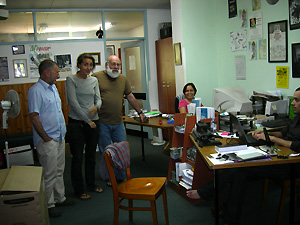 I am reminded of Yael Bartana’s film documenting the reconstruction of one of such houses. Smiling faces, eyes full of hope, heroic poses, the figures shown from below. That’s how the builders of the state of Israel in the 1950s looked like. It’d be interesting to know whether the house rebuilt that summer and filmed by Bartana got demolished by Israeli bulldozers again too. The viewers leave the projection room fortified that the wave is returning, that Israel, with the hands of its activists, is rebuilding Palestinian homes. Asked about the systematic house demolitions in eastern Jerusalem, the city’s mayor replies evasively, ‘As you know perfectly well, the Palestinian population is growing, not shrinking.’ The ICAHD doesn’t know when or where a house is to be demolished. Quite simply, early in the morning, Israeli police and Border Guard personnel gather at a chosen location accompanied by government bulldozers. The police surround the house. Jeff Halper, the ICAHD coordinator, told me in detail how the operation looks like: demolishing a small house takes 20 minutes, a big one – up to two hours. No one informs the inhabitants about the operation – neither the city authorities, nor the Ministry of Internal Affairs, nor the local administration. Tens of thousands of families live in fear of the bulldozers, 22,000 of which in Jerusalem itself. This is in fact a violation of the 4th Geneva Convention (Article 53), which prohibits the demolition of houses in occupied territories. It’s only that Israel does not observe the 4th Geneva Convention. During a recent demolition, Jeff Halper, citing the Convention, ordered a Border Guard officer arrested. He only provoked bursts of laughter and was himself handcuffed. I’d like to film a house demolition. I don’t know whether I can get there on time but I’ll try. If not, I’ll use footage from the ICAHD or B’Tselem.
I am reminded of Yael Bartana’s film documenting the reconstruction of one of such houses. Smiling faces, eyes full of hope, heroic poses, the figures shown from below. That’s how the builders of the state of Israel in the 1950s looked like. It’d be interesting to know whether the house rebuilt that summer and filmed by Bartana got demolished by Israeli bulldozers again too. The viewers leave the projection room fortified that the wave is returning, that Israel, with the hands of its activists, is rebuilding Palestinian homes. Asked about the systematic house demolitions in eastern Jerusalem, the city’s mayor replies evasively, ‘As you know perfectly well, the Palestinian population is growing, not shrinking.’ The ICAHD doesn’t know when or where a house is to be demolished. Quite simply, early in the morning, Israeli police and Border Guard personnel gather at a chosen location accompanied by government bulldozers. The police surround the house. Jeff Halper, the ICAHD coordinator, told me in detail how the operation looks like: demolishing a small house takes 20 minutes, a big one – up to two hours. No one informs the inhabitants about the operation – neither the city authorities, nor the Ministry of Internal Affairs, nor the local administration. Tens of thousands of families live in fear of the bulldozers, 22,000 of which in Jerusalem itself. This is in fact a violation of the 4th Geneva Convention (Article 53), which prohibits the demolition of houses in occupied territories. It’s only that Israel does not observe the 4th Geneva Convention. During a recent demolition, Jeff Halper, citing the Convention, ordered a Border Guard officer arrested. He only provoked bursts of laughter and was himself handcuffed. I’d like to film a house demolition. I don’t know whether I can get there on time but I’ll try. If not, I’ll use footage from the ICAHD or B’Tselem. 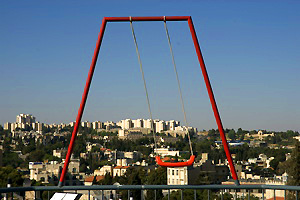 Yesterday I visited an exhibition at the Museum on the Seam, an institution focused on socio-political art. The Museum on the Seam is called so because it is located at a street that separates eastern Jerusalem from western Jerusalem. The house where it is located has participated in every armed conflict to date. It’s a miracle it still stands. I hadn’t seen any art for so long that I felt a pleasant thrill. I realised I didn’t remember when was the last time I participated in a serious exhibition. I think it was six years ago, at Casino Luxembourg, even before the palm. The show has a nice title – Bare Life. As I read, it pointed to ‘the dangerous place where a temporary emergency situation can be turned into a legitimised status quo accepted by the silent majority.’ Many well-known names, including three from Poland – Wilhelm Sasnal, Katarzyna Józefowicz and Artur Żmijewski, that is, the FGF key. Plus, among others, Bruce Nauman, Anselm Kiefer, Carsten Höller, and even Samuel Beckett himself. Most of the visitors were American tourists, which was painful because they were very loud.
Yesterday I visited an exhibition at the Museum on the Seam, an institution focused on socio-political art. The Museum on the Seam is called so because it is located at a street that separates eastern Jerusalem from western Jerusalem. The house where it is located has participated in every armed conflict to date. It’s a miracle it still stands. I hadn’t seen any art for so long that I felt a pleasant thrill. I realised I didn’t remember when was the last time I participated in a serious exhibition. I think it was six years ago, at Casino Luxembourg, even before the palm. The show has a nice title – Bare Life. As I read, it pointed to ‘the dangerous place where a temporary emergency situation can be turned into a legitimised status quo accepted by the silent majority.’ Many well-known names, including three from Poland – Wilhelm Sasnal, Katarzyna Józefowicz and Artur Żmijewski, that is, the FGF key. Plus, among others, Bruce Nauman, Anselm Kiefer, Carsten Höller, and even Samuel Beckett himself. Most of the visitors were American tourists, which was painful because they were very loud. 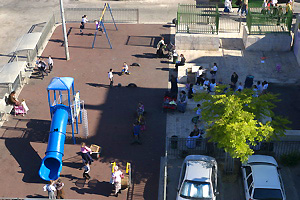 I couldn’t resist the impression that it was yet another manifestation suggesting that Israel is a fully democratic state that, go ahead, please, permits critical statements about the most controversial issue – Israeli apartheid. And as a disguise, to universalise the problem and blur it, the main course was accompanied by hors d’oeuvres in the form of all kinds of other apartheids, oppressions, reprisals, traumas, holocausts, disasters and general misfortunes. Art sometimes works despite, and sometimes instead. I experienced half an hour of genuine joy there. And that was thanks to Wilhelm Sasnal and several other artists. I didn’t notice Sasnal’s name on the list of the participating artists. From the corner of my eye I saw I beautiful painting on the wall. I fixed my gaze on it and was transfixed. Black-and-white, simple, incredible. Four or five women going through a mountain pass, the time is twilight. The women are shown from the back, the light is in front, ahead of them, mountains in the distance. They have scarves on their heads and carry some bags, handbags, stuff, though not too much. They are kind of walking, kind of standing. Everything was in that picture – trauma and fear of the unknown, uncertainty, femininity, weakness. They could have been Arab women at a checkpoint as well as lost tourists in the Tatras. The painting was untitled and that was nice, the question mark – who and what and why. Wilhelm, if you read this blog, please accept my best compliments. I had shivers down my spine.
I couldn’t resist the impression that it was yet another manifestation suggesting that Israel is a fully democratic state that, go ahead, please, permits critical statements about the most controversial issue – Israeli apartheid. And as a disguise, to universalise the problem and blur it, the main course was accompanied by hors d’oeuvres in the form of all kinds of other apartheids, oppressions, reprisals, traumas, holocausts, disasters and general misfortunes. Art sometimes works despite, and sometimes instead. I experienced half an hour of genuine joy there. And that was thanks to Wilhelm Sasnal and several other artists. I didn’t notice Sasnal’s name on the list of the participating artists. From the corner of my eye I saw I beautiful painting on the wall. I fixed my gaze on it and was transfixed. Black-and-white, simple, incredible. Four or five women going through a mountain pass, the time is twilight. The women are shown from the back, the light is in front, ahead of them, mountains in the distance. They have scarves on their heads and carry some bags, handbags, stuff, though not too much. They are kind of walking, kind of standing. Everything was in that picture – trauma and fear of the unknown, uncertainty, femininity, weakness. They could have been Arab women at a checkpoint as well as lost tourists in the Tatras. The painting was untitled and that was nice, the question mark – who and what and why. Wilhelm, if you read this blog, please accept my best compliments. I had shivers down my spine. 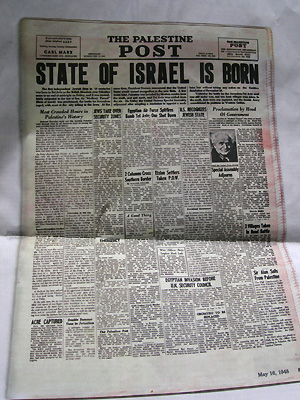 On the roof was a swing mounted to the railing – a work by Carsten Höller. Cool. Light. I looked down. An exclusively orthodox playground. Jewish mamas, nannies and children. It looked like an exhibition piece, superbly thought-out, an interactive installation. And how very political. Only it was far more powerful than all the works shown in Bare Life. Or perhaps I’m infected. Perhaps I strayed too far. I lost my faith in the political effectiveness of such exhibitions. Rebuilding a house with the ICAHD probably makes more sense. Viewing the show I kept thinking about the Bad Boys from Jenin. About how they’d react to it. What they’d like. What they’d laugh at. What they’d compare it to. What they’d understand. I bought myself a nice T-shirt saying ‘Bare Life.’ A bit too large.
On the roof was a swing mounted to the railing – a work by Carsten Höller. Cool. Light. I looked down. An exclusively orthodox playground. Jewish mamas, nannies and children. It looked like an exhibition piece, superbly thought-out, an interactive installation. And how very political. Only it was far more powerful than all the works shown in Bare Life. Or perhaps I’m infected. Perhaps I strayed too far. I lost my faith in the political effectiveness of such exhibitions. Rebuilding a house with the ICAHD probably makes more sense. Viewing the show I kept thinking about the Bad Boys from Jenin. About how they’d react to it. What they’d like. What they’d laugh at. What they’d compare it to. What they’d understand. I bought myself a nice T-shirt saying ‘Bare Life.’ A bit too large. 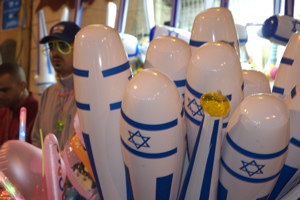 So I’m sitting in this T-shirt a Palm Hostel. The anniversary celebrations are under way. Jaffa Road and Ben Yehuda surrounded by the military, police, plainclothes agents. Damn military celebrations… Among the souvenirs are swords, inflatable hammers and Star-of-David baseball bats. I tried to imagine an inflatable baseball bat with a Polish flag. Ouch. Some amused old guy hit me on the head with a bat like that.
So I’m sitting in this T-shirt a Palm Hostel. The anniversary celebrations are under way. Jaffa Road and Ben Yehuda surrounded by the military, police, plainclothes agents. Damn military celebrations… Among the souvenirs are swords, inflatable hammers and Star-of-David baseball bats. I tried to imagine an inflatable baseball bat with a Polish flag. Ouch. Some amused old guy hit me on the head with a bat like that. 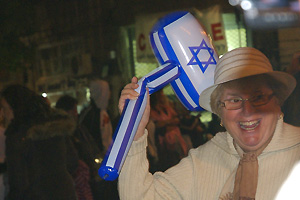 The West Bank is inaccessible. The checkpoints have been closed due to the celebrations. Israel has to celebrate the 60th anniversary of its democratic state in peace, after all. It will be even worse next week, even more military and police – George W. Bush, Tony Blair, Henry Kissinger, Mikhail Gorbachev, Rupert Murdoch and the founders of Google and Facebook are due in Jerusalem. May 1, 2008 Three days and one night in solitude, spent on writing, brought me to a state of complete incorporeality. I know this condition, I have to stand up, touch my cheek, reach out with my hand backwards and feel my shoulder blade to remind myself that I exist at all. Looking into the mirror works too, though the reflection is incorporeal. I went yesterday to the cake shop where I used the spent the evenings with the guys – Nabeel, Żwirek, Mustafa, Mike and Tarek. They are all gone now. They love glow tubes in the Middle East so we sat under an extremely white glow tube and a howling fan. There was a baldish palm tree outside and still, hot air. I ordered tea, the lousy Lipton, because that’s all they’ve got, and some kind of cheese cake, and reached for a book, but I couldn’t even get through a single page. Arab bankers in ugly suits sat next to me, doing business. Gel-styled hair, pointed-toe shoes. I looked at a poster with an image of Edward Said, the father of post-colonial theories, and I felt I was in the right place, not besides but right here. Only that ‘here’ remained a strange place for me. From time to time I walk down from my big, empty four-room flat with a large kitchen to the theatre office, where Juliano asks me ceremonially, ‘Joanna, where are you hiding?’ to which I reply equally ceremonially, ‘I’m not hiding, I’m working.’ Then I walk rigidly to the shop, where the shopkeeper asks me, ‘Humus?’ ‘Humus,’ I reply ‘Pita?’ ‘Pita,’ I confirm, and with the humus, pita and a bottle of grapefruit juice I walk back with the same rigid gait to my cave. When I’m seventy it’ll probably still be the same. I’ll be living in Ghana, ferociously fighting for some refugees’ rights and earning my living designing websites. A wheelchair waiting in the hall. I’ll be even skinnier and my hearing will be even worse. Yeah, a retreat like this makes you realise many things. For instance that in order to have my film edited in a professional manner I should earn some money to pay an editor. I earned for my stay here and Żwirek’s visit. I earned for the camera. This leaves editing. The funniest thing is that I don’t have where to show this film. I’ll probably soon read on some web forum that I’m wasting public funds on suspicious trips. I’ve managed to put a certain intuition into writing; it even has a title, Jenin Refugee Camp Central Station – a five-day street performance. But before the project had been described in detail, it grew and I lost control of it.
The West Bank is inaccessible. The checkpoints have been closed due to the celebrations. Israel has to celebrate the 60th anniversary of its democratic state in peace, after all. It will be even worse next week, even more military and police – George W. Bush, Tony Blair, Henry Kissinger, Mikhail Gorbachev, Rupert Murdoch and the founders of Google and Facebook are due in Jerusalem. May 1, 2008 Three days and one night in solitude, spent on writing, brought me to a state of complete incorporeality. I know this condition, I have to stand up, touch my cheek, reach out with my hand backwards and feel my shoulder blade to remind myself that I exist at all. Looking into the mirror works too, though the reflection is incorporeal. I went yesterday to the cake shop where I used the spent the evenings with the guys – Nabeel, Żwirek, Mustafa, Mike and Tarek. They are all gone now. They love glow tubes in the Middle East so we sat under an extremely white glow tube and a howling fan. There was a baldish palm tree outside and still, hot air. I ordered tea, the lousy Lipton, because that’s all they’ve got, and some kind of cheese cake, and reached for a book, but I couldn’t even get through a single page. Arab bankers in ugly suits sat next to me, doing business. Gel-styled hair, pointed-toe shoes. I looked at a poster with an image of Edward Said, the father of post-colonial theories, and I felt I was in the right place, not besides but right here. Only that ‘here’ remained a strange place for me. From time to time I walk down from my big, empty four-room flat with a large kitchen to the theatre office, where Juliano asks me ceremonially, ‘Joanna, where are you hiding?’ to which I reply equally ceremonially, ‘I’m not hiding, I’m working.’ Then I walk rigidly to the shop, where the shopkeeper asks me, ‘Humus?’ ‘Humus,’ I reply ‘Pita?’ ‘Pita,’ I confirm, and with the humus, pita and a bottle of grapefruit juice I walk back with the same rigid gait to my cave. When I’m seventy it’ll probably still be the same. I’ll be living in Ghana, ferociously fighting for some refugees’ rights and earning my living designing websites. A wheelchair waiting in the hall. I’ll be even skinnier and my hearing will be even worse. Yeah, a retreat like this makes you realise many things. For instance that in order to have my film edited in a professional manner I should earn some money to pay an editor. I earned for my stay here and Żwirek’s visit. I earned for the camera. This leaves editing. The funniest thing is that I don’t have where to show this film. I’ll probably soon read on some web forum that I’m wasting public funds on suspicious trips. I’ve managed to put a certain intuition into writing; it even has a title, Jenin Refugee Camp Central Station – a five-day street performance. But before the project had been described in detail, it grew and I lost control of it. 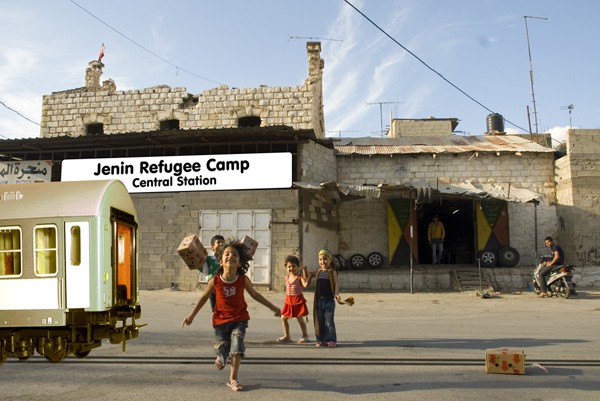 Not far from the theatre, on the way to Juliano and Jenny’s house, is a small square. We went to the butcher’s there. Next to the butcher’s is a small grocery store, a car repair garage in front of which sits an old, red-haired man on a wheelchair, and a carpenter’s. The carpenter’s shop is in an annex to a large, strange stone building. People told me it was an old Turkish train station from the Ottoman times. ‘Turkiye, Turkiye,’ they kept repeating. And here, right under your feet, is the rail track, added Jonathan. I felt shivers down my spine. I suddenly saw in my mind’s eye the image of a welcoming orchestra, flowers, the whole hullabaloo and joyful chaos accompanying the departures and returns from holidays. That was some two weeks ago. Now I went there to take some photos and montage into a picture of the station the following simple inscription: Jenin Refugee Camp Central Station, and juxtapose a railroad car with that. The car is Polish, but so what, a small gesture of Polish solidarity with the victims of occupation.
Not far from the theatre, on the way to Juliano and Jenny’s house, is a small square. We went to the butcher’s there. Next to the butcher’s is a small grocery store, a car repair garage in front of which sits an old, red-haired man on a wheelchair, and a carpenter’s. The carpenter’s shop is in an annex to a large, strange stone building. People told me it was an old Turkish train station from the Ottoman times. ‘Turkiye, Turkiye,’ they kept repeating. And here, right under your feet, is the rail track, added Jonathan. I felt shivers down my spine. I suddenly saw in my mind’s eye the image of a welcoming orchestra, flowers, the whole hullabaloo and joyful chaos accompanying the departures and returns from holidays. That was some two weeks ago. Now I went there to take some photos and montage into a picture of the station the following simple inscription: Jenin Refugee Camp Central Station, and juxtapose a railroad car with that. The car is Polish, but so what, a small gesture of Polish solidarity with the victims of occupation. 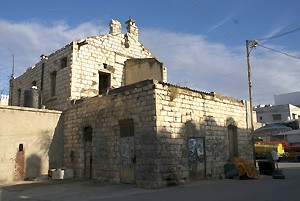 The performance would require some technical preparations – laying some 300 metres of tracks, bringing an old railroad car from Jordan or Israel, installing ‘Platform 1,’ ‘Platform 2′ etc. plaques and stands. When everything is ready, the kids from the theatre will become passengers, conductors, luggage porters. I imagine them getting out of the car, in their sunglasses, carrying all those suitcases and backpacks, the band plays, the loudspeakers announce a train to Warsaw departing in five minutes’ time, stopping at: Amman, Damascus, Istanbul, Sophia, Bucharest, Bratislava, Cracow… And we roll the car from the square. People will first want to go to Haifa, their home town, Juliano notices soberly in an e-mail (we are e-mailing each other from a distance of 50 metres – I am in my apartment, he at the theatre downstairs). They will decide themselves where they want to go, the performance will be an open formula, I reply.
The performance would require some technical preparations – laying some 300 metres of tracks, bringing an old railroad car from Jordan or Israel, installing ‘Platform 1,’ ‘Platform 2′ etc. plaques and stands. When everything is ready, the kids from the theatre will become passengers, conductors, luggage porters. I imagine them getting out of the car, in their sunglasses, carrying all those suitcases and backpacks, the band plays, the loudspeakers announce a train to Warsaw departing in five minutes’ time, stopping at: Amman, Damascus, Istanbul, Sophia, Bucharest, Bratislava, Cracow… And we roll the car from the square. People will first want to go to Haifa, their home town, Juliano notices soberly in an e-mail (we are e-mailing each other from a distance of 50 metres – I am in my apartment, he at the theatre downstairs). They will decide themselves where they want to go, the performance will be an open formula, I reply. 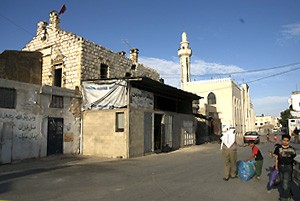 That was yesterday. Today I went down to the office (walking rigidly, on my way for some pita and humus) and it suddenly turned out that the project had already undergone numerous modifications and alterations. ‘We’ll lay real tracks,’ said Juliano, ‘the small-gauge ones. Through the whole camp and down to the town.’ ‘We can create stations in the camp, prepare charts and photos showing what happened there,’ added Mussadak, the accountant, who never speaks. ‘Adnan, you will build the locomotive, or at least an engine,’ said Juliano. ‘No problem, Adnan has just repaired some batteries.’ ‘It’ll take us two years to get the permissions,’ I moaned. ‘Here? In the camp? No way, one word from Zacharia and it’s done.’
That was yesterday. Today I went down to the office (walking rigidly, on my way for some pita and humus) and it suddenly turned out that the project had already undergone numerous modifications and alterations. ‘We’ll lay real tracks,’ said Juliano, ‘the small-gauge ones. Through the whole camp and down to the town.’ ‘We can create stations in the camp, prepare charts and photos showing what happened there,’ added Mussadak, the accountant, who never speaks. ‘Adnan, you will build the locomotive, or at least an engine,’ said Juliano. ‘No problem, Adnan has just repaired some batteries.’ ‘It’ll take us two years to get the permissions,’ I moaned. ‘Here? In the camp? No way, one word from Zacharia and it’s done.’ 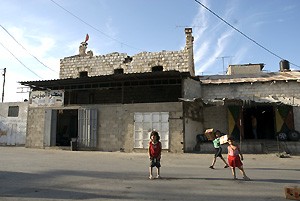 If you have never visited a Palestinian refugee camp, you don’t know what it means not to be able to go anywhere. It’s like putting someone inside a glass jar and sealing the lid. Going to Ramallah is like bouncing off a glass wall. Words like ‘travel,’ ‘space,’ ‘sea,’ ‘train’ act like fuses, making present that which has been lawlessly taken away from you. That’s probably why Juliano says that if the project gets through, a revolution will begin here. 5.05.08
If you have never visited a Palestinian refugee camp, you don’t know what it means not to be able to go anywhere. It’s like putting someone inside a glass jar and sealing the lid. Going to Ramallah is like bouncing off a glass wall. Words like ‘travel,’ ‘space,’ ‘sea,’ ‘train’ act like fuses, making present that which has been lawlessly taken away from you. That’s probably why Juliano says that if the project gets through, a revolution will begin here. 5.05.08 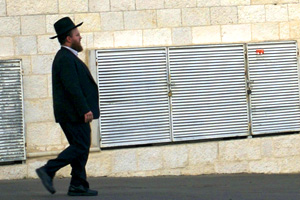 ‘The Hasidim walk like this,’ Leslie thrusts her chest forward, throws the right leg forward, very quickly, the steps are small, it’s almost like waddling, then the left leg, then the right, the left, the right, she waves her arms to the rhythm, with full control, not too high. And she pushes forward, her upper body leaning aggressively, cutting through the air. Then she stops and bursts out laughing. ‘And their dress, the frock coats, the tails flapping in the wind, the fur hats. It’s not easy to push through the air dressed like that.’ ‘We should do a project about it. About how the Arabs walk – slumped, stooped, scowling at you, and then the Hasidim – straight like sticks, kind of pushed forward.’ We live in neighbouring hostels in Eastern Jerusalem, crowds teem in the Arab shops below. If you buy little, they get angry and raise the price. One lemon is three shekels, the same as two lemons and five courgettes. We both came from the theatre, using slightly different routes and for different purposes. Chance brought us together again.
‘The Hasidim walk like this,’ Leslie thrusts her chest forward, throws the right leg forward, very quickly, the steps are small, it’s almost like waddling, then the left leg, then the right, the left, the right, she waves her arms to the rhythm, with full control, not too high. And she pushes forward, her upper body leaning aggressively, cutting through the air. Then she stops and bursts out laughing. ‘And their dress, the frock coats, the tails flapping in the wind, the fur hats. It’s not easy to push through the air dressed like that.’ ‘We should do a project about it. About how the Arabs walk – slumped, stooped, scowling at you, and then the Hasidim – straight like sticks, kind of pushed forward.’ We live in neighbouring hostels in Eastern Jerusalem, crowds teem in the Arab shops below. If you buy little, they get angry and raise the price. One lemon is three shekels, the same as two lemons and five courgettes. We both came from the theatre, using slightly different routes and for different purposes. Chance brought us together again. 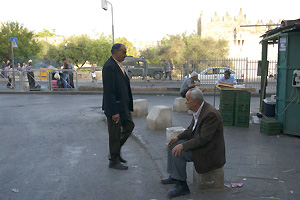 ‘Or we could do another project, which we talked about for a month in Jenin – Camping Palestine. Organise a camping site, with a booth and an attendant, tents, outdoor showers, a canoe rental, and a couple of inflatable swimming pools to soak your feet in water.’ All that to disenchant one word – ‘camp’ and replace it with ‘camping.’ ‘Or we could create a Palestinian version of Monopoly – whatever you do, you go to prison, wherever you go, you end up at a checkpoint, you build a house, a bulldozer arrives, you buy some land, a Jewish settler turns up surrounded by soldiers.’ We go every day to B’Tselem, an Israeli non-governmental human rights organisation, to view footage from the Shooting Back programme. For over a year now B’Tselem has been presenting Palestinians with small DV cameras so that they can record violence and legal abuses in the Territories, especially in Hebron and Gaza. A huge video library has been created on the basis of the laboriously archivised tapes. We sit there for days and watch house demolitions, Israeli bulldozers, chaos at the checkpoints, the cursing Jewish settlers, the settler children being instructed by their parents how to throw stones at the Palestinians, and the daily violence. An endless stream of toxins. I’m so tired by all this that afterwards I just want to have a drink.
‘Or we could do another project, which we talked about for a month in Jenin – Camping Palestine. Organise a camping site, with a booth and an attendant, tents, outdoor showers, a canoe rental, and a couple of inflatable swimming pools to soak your feet in water.’ All that to disenchant one word – ‘camp’ and replace it with ‘camping.’ ‘Or we could create a Palestinian version of Monopoly – whatever you do, you go to prison, wherever you go, you end up at a checkpoint, you build a house, a bulldozer arrives, you buy some land, a Jewish settler turns up surrounded by soldiers.’ We go every day to B’Tselem, an Israeli non-governmental human rights organisation, to view footage from the Shooting Back programme. For over a year now B’Tselem has been presenting Palestinians with small DV cameras so that they can record violence and legal abuses in the Territories, especially in Hebron and Gaza. A huge video library has been created on the basis of the laboriously archivised tapes. We sit there for days and watch house demolitions, Israeli bulldozers, chaos at the checkpoints, the cursing Jewish settlers, the settler children being instructed by their parents how to throw stones at the Palestinians, and the daily violence. An endless stream of toxins. I’m so tired by all this that afterwards I just want to have a drink. 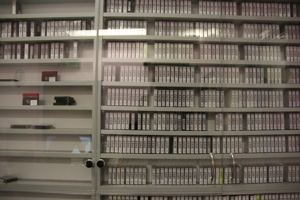 I was visited today by Sarit Michaeli, the B’Tselem spokesperson, who asked me for what purpose I would use the video footage. I was a bit surprised because I told them that even my arrival here. So I told her about my project. It is to be a two-channel video projection, part of the Herzl Project, a project devoted to Herzl Street and Herzl’s ideas. I wanted to show the contemporary reality of the state of Israel, an utopia fulfilled. I found a video showing the demolition of a Palestinian house and a Purim parade in Hebron. The last few Palestinian residents in Hebron live in houses surrounded by Jewish settlers. They seldom leave their homes because they are subject to constant abuse – Jewish children, instructed by their parents, throw stones at them, the women are spat at, all kinds of waste, garbage, used diapers are thrown into their courtyards. They had to fence themselves off, bar the balconies. Their live has become unbearable, but they are too poor to move out.
I was visited today by Sarit Michaeli, the B’Tselem spokesperson, who asked me for what purpose I would use the video footage. I was a bit surprised because I told them that even my arrival here. So I told her about my project. It is to be a two-channel video projection, part of the Herzl Project, a project devoted to Herzl Street and Herzl’s ideas. I wanted to show the contemporary reality of the state of Israel, an utopia fulfilled. I found a video showing the demolition of a Palestinian house and a Purim parade in Hebron. The last few Palestinian residents in Hebron live in houses surrounded by Jewish settlers. They seldom leave their homes because they are subject to constant abuse – Jewish children, instructed by their parents, throw stones at them, the women are spat at, all kinds of waste, garbage, used diapers are thrown into their courtyards. They had to fence themselves off, bar the balconies. Their live has become unbearable, but they are too poor to move out. 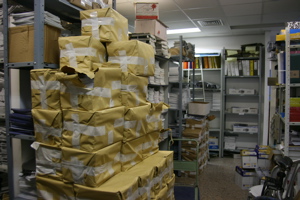 The Purim parade is a feast of joy, a wild carnival, complete with dressing up, drinking, dancing and tomfoolery. Against the barred Palestinian balconies, escorted by armoured vehicles, a colourful crowd passes. Kids dressed up as geishas and soldiers, grown-ups in huge wigs, shiny costumes, figures created with fabrics stretched on wooden frames and carried high above the paraders’ heads. Curious Palestinian children watch the whole thing hidden behind tall concrete barriers. Music pounding away, kind of cabaret, kind of klezmer. It’s a carnival in hell, because Hebron has become hell for the Palestinians. I can’t use this clip because I’ve taken a political position on the conflict. I’ve been told that B’Tselem makes its materials available only to those whose activities are within the B’Tselem mandate, that is, the defence of human rights.
The Purim parade is a feast of joy, a wild carnival, complete with dressing up, drinking, dancing and tomfoolery. Against the barred Palestinian balconies, escorted by armoured vehicles, a colourful crowd passes. Kids dressed up as geishas and soldiers, grown-ups in huge wigs, shiny costumes, figures created with fabrics stretched on wooden frames and carried high above the paraders’ heads. Curious Palestinian children watch the whole thing hidden behind tall concrete barriers. Music pounding away, kind of cabaret, kind of klezmer. It’s a carnival in hell, because Hebron has become hell for the Palestinians. I can’t use this clip because I’ve taken a political position on the conflict. I’ve been told that B’Tselem makes its materials available only to those whose activities are within the B’Tselem mandate, that is, the defence of human rights. 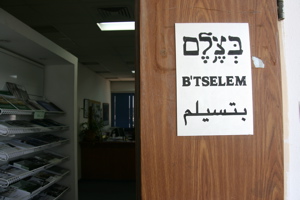 Lawyers, documentalists, journalists can use the video library, provided they take no political position. An artist who wants to represent the reality of the state of Israel in 2008 as seen through the eyes of those whom this state occupies cannot do so. There is no objective documentary, no legal case where the law does not serve to defend the rights of either party, I argued. I fell silent when I heard about pressure from the Ministry of Internal Affairs. Unfortunately, access to the video clips was also refused to journalists preparing materials about the Nakba, the Palestinian tragedy of 1948. It’s interesting that none of the Israeli institutions claiming to be left-oriented and interested in the conflict came to my aid. 28.04.08 Jerusalem. I am at Palm Hostel, seated next to an American couple who are playing online games and checking their Facebook accounts. I am relaxing in an atmosphere of anonymity, of cool international backpack tourism. I like to disappear like that.
Lawyers, documentalists, journalists can use the video library, provided they take no political position. An artist who wants to represent the reality of the state of Israel in 2008 as seen through the eyes of those whom this state occupies cannot do so. There is no objective documentary, no legal case where the law does not serve to defend the rights of either party, I argued. I fell silent when I heard about pressure from the Ministry of Internal Affairs. Unfortunately, access to the video clips was also refused to journalists preparing materials about the Nakba, the Palestinian tragedy of 1948. It’s interesting that none of the Israeli institutions claiming to be left-oriented and interested in the conflict came to my aid. 28.04.08 Jerusalem. I am at Palm Hostel, seated next to an American couple who are playing online games and checking their Facebook accounts. I am relaxing in an atmosphere of anonymity, of cool international backpack tourism. I like to disappear like that. 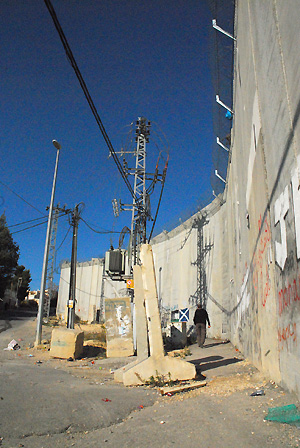 I spent last evening with Tzviya at her beautiful home in the German Colony. Tzviya’s daughter, Danielle, nearly died in a suicide bombing eleven years ago on Ben Yehuda. She was saved by her long, thick hair which muffled the impact of the shrapnels. She went through clinical death, then sepsis. She tries to live a normal life, but her brain has been irreversibly damaged and she does everything slowly, very slowly. Tzviya said her friend’s daughter had signed up for an trip to Poland. ‘Gasfair,’ Tzviya says and laughs hard, waving her plump hands, a gold ring on each finger. ‘You know what gasfair is?’ ‘A cross between a gas chamber and a funfair, I guess.’ ‘That’s right,’ she confirms. Then she asks me why I have come to Israel. I tell her about the Jenin camp, the theatre, the workshop. ‘Holocaust, isn’t it?’ she says casually and gulps another vodka. ‘Yeah,’ I start hesitantly, ‘some of the mechanisms are identical, but overall the comparison is simplistic.’ Then I give her a detailed account of life in the camp, relate the tragic stories, tell her about the little Nabeel whom his grandmother had taken to Kiryat Gat to show him their old family house from which the whole family had been evicted, about Adnan tied to an Israeli bulldozer, about Juliano and the destruction of Arna Mer Khamis’s Stone Theater. I also tell her about the demoralisation, about the camp being a ticking time bomb and a breeding ground for extremists, and that I have long stopped being surprised at those who, a dynamite belt wrapped around their waist, go blow themselves up. ‘You see any chance for this conflict to be solved?’ Tzviya asks me. ‘No,’ I reply. ‘I don’t. And, though I know perfectly well it’s utterly unrealistic, you can’t refuse these people the right to return to their homes, villages, towns. Put shortly, Israel should give the people from the refugee camps the right to return. But it’s unrealistic,’ I contradict myself. And then, suddenly, Tzviya explodes. She shouts that the Palestinians are demoralised, corrupt, that they should get down to work instead of asking for aid, that her mother, who as the only member of the family had survived the Shoah, managed after war despite having nothing. A bragging match about traumas. Why could the Jews manage and the Palestinians can’t? I look at her incredulously. First a classic ethnic cleansing is carried out, combined with a liquidation of the most intelligent and leader-type individuals. Then people are resettled, often several times, and now they are expected to be entrepreneurial and enthusiastic, and that despite living in an extremely efficient apartheid system?
I spent last evening with Tzviya at her beautiful home in the German Colony. Tzviya’s daughter, Danielle, nearly died in a suicide bombing eleven years ago on Ben Yehuda. She was saved by her long, thick hair which muffled the impact of the shrapnels. She went through clinical death, then sepsis. She tries to live a normal life, but her brain has been irreversibly damaged and she does everything slowly, very slowly. Tzviya said her friend’s daughter had signed up for an trip to Poland. ‘Gasfair,’ Tzviya says and laughs hard, waving her plump hands, a gold ring on each finger. ‘You know what gasfair is?’ ‘A cross between a gas chamber and a funfair, I guess.’ ‘That’s right,’ she confirms. Then she asks me why I have come to Israel. I tell her about the Jenin camp, the theatre, the workshop. ‘Holocaust, isn’t it?’ she says casually and gulps another vodka. ‘Yeah,’ I start hesitantly, ‘some of the mechanisms are identical, but overall the comparison is simplistic.’ Then I give her a detailed account of life in the camp, relate the tragic stories, tell her about the little Nabeel whom his grandmother had taken to Kiryat Gat to show him their old family house from which the whole family had been evicted, about Adnan tied to an Israeli bulldozer, about Juliano and the destruction of Arna Mer Khamis’s Stone Theater. I also tell her about the demoralisation, about the camp being a ticking time bomb and a breeding ground for extremists, and that I have long stopped being surprised at those who, a dynamite belt wrapped around their waist, go blow themselves up. ‘You see any chance for this conflict to be solved?’ Tzviya asks me. ‘No,’ I reply. ‘I don’t. And, though I know perfectly well it’s utterly unrealistic, you can’t refuse these people the right to return to their homes, villages, towns. Put shortly, Israel should give the people from the refugee camps the right to return. But it’s unrealistic,’ I contradict myself. And then, suddenly, Tzviya explodes. She shouts that the Palestinians are demoralised, corrupt, that they should get down to work instead of asking for aid, that her mother, who as the only member of the family had survived the Shoah, managed after war despite having nothing. A bragging match about traumas. Why could the Jews manage and the Palestinians can’t? I look at her incredulously. First a classic ethnic cleansing is carried out, combined with a liquidation of the most intelligent and leader-type individuals. Then people are resettled, often several times, and now they are expected to be entrepreneurial and enthusiastic, and that despite living in an extremely efficient apartheid system? 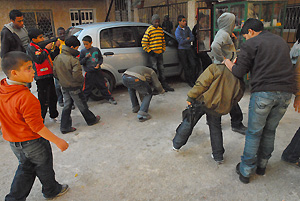 I somehow failed to utter the remark that a more correct comparison would be a WWII-era Jewish ghetto rather than 1950s Israel. Perhaps without the death camp transports. Then I heard that if there’s so much poverty at the camp, what do they need a theatre for? Let them better learn to read and write. Freedom Theatre is an alternative educational facility where the kids study Palestinian and English, and even math, went my simple argument. But Tzviya wouldn’t have it. All these voluntaries like you only make the situation worse, confirming them in their hopelessness and trauma, she said. Next morning she apologised to me and said she would like to continue our conversation. But I don’t think I want that. Uncontrolled emotional outbursts is something I can hardly stand. I can’t reset myself afterwards. I will gladly board a Palestinian service that, down the Autonomy’s very bad and very winding roads, will take me to the theatre. The better roads are reserved for the Israelis. 26.04.08 Last night, during a farewell dinner, Żwirek was officially named Žižek. Partly because Juliano is reading Žižek, and partly because ‘Żwirek” is very hard to pronounce.
I somehow failed to utter the remark that a more correct comparison would be a WWII-era Jewish ghetto rather than 1950s Israel. Perhaps without the death camp transports. Then I heard that if there’s so much poverty at the camp, what do they need a theatre for? Let them better learn to read and write. Freedom Theatre is an alternative educational facility where the kids study Palestinian and English, and even math, went my simple argument. But Tzviya wouldn’t have it. All these voluntaries like you only make the situation worse, confirming them in their hopelessness and trauma, she said. Next morning she apologised to me and said she would like to continue our conversation. But I don’t think I want that. Uncontrolled emotional outbursts is something I can hardly stand. I can’t reset myself afterwards. I will gladly board a Palestinian service that, down the Autonomy’s very bad and very winding roads, will take me to the theatre. The better roads are reserved for the Israelis. 26.04.08 Last night, during a farewell dinner, Żwirek was officially named Žižek. Partly because Juliano is reading Žižek, and partly because ‘Żwirek” is very hard to pronounce. 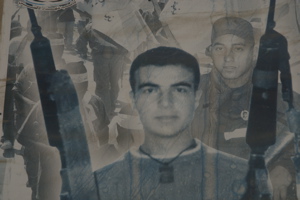 A desert wind. So hot it burns your face. We rode to Ramallah for two hours, gathering passengers along the way, the Palestinian services are rather slow. At a checkpoint a soldier asked me where I was from. Jenin, I said instinctively. He looked at me, not understanding. Ok, from Poland, I corrected myself. Holland? No, P-o-l-a-n-d. Poland. It’s strange talking to someone who aims at you with their M16. On a nearby hill stood a torn garden umbrella and under it another guy with an M16. An occupation. When you try to describe the situation in the Occupied Territories, you keep repeating words that themselves signal helplessness: cage, jail, can, impossibility, powerlessness. You need to use some nonexistent negative mode. Introduce concepts to negate them. What is most painful is the impossibility of travelling, of going somewhere, experiencing the simple feeling of detachment and distance; it’s one of Israel’s main sins against the Palestinians – confine people to a closed area surrounded by walls and watchtowers, APCs, M16s and soldiers. Your every movement is slowed down or blocked. Humiliation awaits you at every checkpoint. I didn’t feel that so much at the beginning, now, with every checkpoint, when the Palestinians pull out their crumpled papers, I feel ever more weary, bitter, angry. When I brought my backpack to the theatre office this morning, the Bad Boys were there, sitting on a sofa. I felt like suddenly their gazes fell on one thing – the backpack. Then they looked at me. ‘You’re leaving.’ ‘I’ll be back,’ I replied automatically, ‘I’m back soon, in four days.’ ‘Put me in your backpack,’ said Rame, who weighs at least 80 kilos. ‘I would, Rame.’
A desert wind. So hot it burns your face. We rode to Ramallah for two hours, gathering passengers along the way, the Palestinian services are rather slow. At a checkpoint a soldier asked me where I was from. Jenin, I said instinctively. He looked at me, not understanding. Ok, from Poland, I corrected myself. Holland? No, P-o-l-a-n-d. Poland. It’s strange talking to someone who aims at you with their M16. On a nearby hill stood a torn garden umbrella and under it another guy with an M16. An occupation. When you try to describe the situation in the Occupied Territories, you keep repeating words that themselves signal helplessness: cage, jail, can, impossibility, powerlessness. You need to use some nonexistent negative mode. Introduce concepts to negate them. What is most painful is the impossibility of travelling, of going somewhere, experiencing the simple feeling of detachment and distance; it’s one of Israel’s main sins against the Palestinians – confine people to a closed area surrounded by walls and watchtowers, APCs, M16s and soldiers. Your every movement is slowed down or blocked. Humiliation awaits you at every checkpoint. I didn’t feel that so much at the beginning, now, with every checkpoint, when the Palestinians pull out their crumpled papers, I feel ever more weary, bitter, angry. When I brought my backpack to the theatre office this morning, the Bad Boys were there, sitting on a sofa. I felt like suddenly their gazes fell on one thing – the backpack. Then they looked at me. ‘You’re leaving.’ ‘I’ll be back,’ I replied automatically, ‘I’m back soon, in four days.’ ‘Put me in your backpack,’ said Rame, who weighs at least 80 kilos. ‘I would, Rame.’ 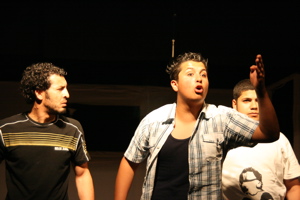 I felt terrible. When you keep animas in a cage, they start biting each other. It’s the same with people. People in the camp are suspicious of each other, mistrustful, demoralised. They think people working for the theatre make fortunes at the expense of the traumatised camp kids. That the theatre is just another colonial means of enslavement. They think they’re entitled to everything. Flour from the UNRWA, training from European volunteers at the Freedom Theatre, money from the EU – all those things should be simply given to them, just like that.
I felt terrible. When you keep animas in a cage, they start biting each other. It’s the same with people. People in the camp are suspicious of each other, mistrustful, demoralised. They think people working for the theatre make fortunes at the expense of the traumatised camp kids. That the theatre is just another colonial means of enslavement. They think they’re entitled to everything. Flour from the UNRWA, training from European volunteers at the Freedom Theatre, money from the EU – all those things should be simply given to them, just like that. 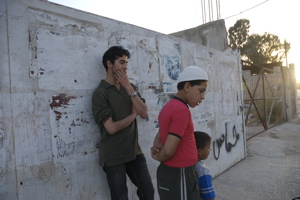 They channel the tension in violence, also against each other. The Palestinians fire not only at Israeli soldiers, they also fire at other Palestinians. And of course the women pay a double price for all that because the Israeli occupation means for them an occupation in their own home – an inability to undertake any outside activity, violence, an inhuman law of honour applied in case of unfaithfulness. Let alone having to cover your body. I had a couple of workshops with girls and they were unable to make even a single movement, mobilise their body language on even the most basis level.
They channel the tension in violence, also against each other. The Palestinians fire not only at Israeli soldiers, they also fire at other Palestinians. And of course the women pay a double price for all that because the Israeli occupation means for them an occupation in their own home – an inability to undertake any outside activity, violence, an inhuman law of honour applied in case of unfaithfulness. Let alone having to cover your body. I had a couple of workshops with girls and they were unable to make even a single movement, mobilise their body language on even the most basis level. 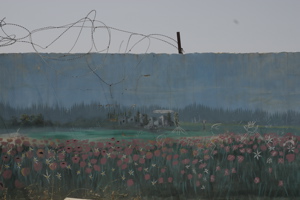 One day we recorded with Żwirek scenes of powerlessness, impotence. Enacted by kids from the theatre. Someone walks up to the door, makes a move as if to exit, but the decision isn’t made, they withdraw. Someone picks up a cup of tea, raises it to their mouth, only to put it back after a moment of hesitation. Someone sits, stands up, sits again. A few steps forward, then a few steps backward. Feigned movement. Present imperfective. 21.04.08
One day we recorded with Żwirek scenes of powerlessness, impotence. Enacted by kids from the theatre. Someone walks up to the door, makes a move as if to exit, but the decision isn’t made, they withdraw. Someone picks up a cup of tea, raises it to their mouth, only to put it back after a moment of hesitation. Someone sits, stands up, sits again. A few steps forward, then a few steps backward. Feigned movement. Present imperfective. 21.04.08 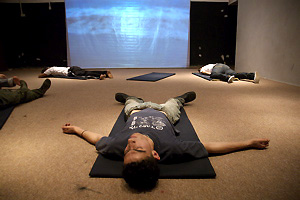 ‘We’re in the middle of it, we can’t enact trauma onstage because when we leave the theatre, the trauma sucks us in. We’re stuck right in the middle of it. We’re unable to re-enact the gestures and sounds of invasion, intifada, the funerals…’ What remains is fiction, meaningful fiction… anything that will generate a sense of distance towards reality, necessary to see it at all. I listened to songs by Marian Hemar yesterday. Outside the window was a mosque, the muezzin, sheep, a car junkyard, kids throwing stones. Songs from pre-war Poland sounded here like sounds from outer space, sounds of some alien civilisation. Perhaps that’s why the music had such a powerful effect. I decided to take one track for the workshop. Breathing exercises, flexing and slackening your muscles… A slight dizziness. Then the boys lay on mattresses, I turned off the lights and on a large screen appeared the sea. A one-minute looped, blurry clip, shot from the hand, the image was shaky, but it all didn’t matter. What mattered was the slow rhythmic swoosh, the waving sound. They closed their eyes but then they kept turning their heads towards the screen to see the image. The sea is something that focuses all their dreams – of getting their own country back, of freedom, the beach, pleasure. Of something that is simply given and needs no care, planning or discipline, things they’re incapable of. After ten or so minutes I turned down the sea and Hemar’s Spring, Spring, Spring… started. Some actually fell asleep. Nabeel slept so hard he actually dreamed. He said he dreamt nightmares. Perhaps those related to his Japanese trip, his visa and passport which are still at the Japanese embassy in Tel Aviv and he has no way of picking them up… I didn’t ask the others. I left them with their dreams.
‘We’re in the middle of it, we can’t enact trauma onstage because when we leave the theatre, the trauma sucks us in. We’re stuck right in the middle of it. We’re unable to re-enact the gestures and sounds of invasion, intifada, the funerals…’ What remains is fiction, meaningful fiction… anything that will generate a sense of distance towards reality, necessary to see it at all. I listened to songs by Marian Hemar yesterday. Outside the window was a mosque, the muezzin, sheep, a car junkyard, kids throwing stones. Songs from pre-war Poland sounded here like sounds from outer space, sounds of some alien civilisation. Perhaps that’s why the music had such a powerful effect. I decided to take one track for the workshop. Breathing exercises, flexing and slackening your muscles… A slight dizziness. Then the boys lay on mattresses, I turned off the lights and on a large screen appeared the sea. A one-minute looped, blurry clip, shot from the hand, the image was shaky, but it all didn’t matter. What mattered was the slow rhythmic swoosh, the waving sound. They closed their eyes but then they kept turning their heads towards the screen to see the image. The sea is something that focuses all their dreams – of getting their own country back, of freedom, the beach, pleasure. Of something that is simply given and needs no care, planning or discipline, things they’re incapable of. After ten or so minutes I turned down the sea and Hemar’s Spring, Spring, Spring… started. Some actually fell asleep. Nabeel slept so hard he actually dreamed. He said he dreamt nightmares. Perhaps those related to his Japanese trip, his visa and passport which are still at the Japanese embassy in Tel Aviv and he has no way of picking them up… I didn’t ask the others. I left them with their dreams. 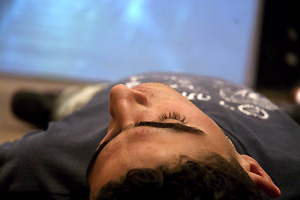 We left the dark, cool theatre room right into scorching heat, the chaos of the kids, dust and litter. We decided with Nabeel, now awake, to go for a pizza. Żwirek asked for an extra portion of ketchup because he loves it. If we had also been able to get cold beer it would have been paradise but here, in the camp, and even in the city of Jenin itself, you won’t get any alcohol, although everyone drinks at home, unofficially of course. And that’s how the workshop ended. For Leslie Dryer, a young American who makes a documentary here about the situation in Palestine, Żwirek shot two interviews – with Zaccharia Zubeidi and a would-be suicide bomber from Tulkarem, Shifa Al-Qudsi. Zaccharia said there were no would-be suicide bombers. That a suicide bomber wouldn’t allow himself or herself to be caught, that it was a political game.
We left the dark, cool theatre room right into scorching heat, the chaos of the kids, dust and litter. We decided with Nabeel, now awake, to go for a pizza. Żwirek asked for an extra portion of ketchup because he loves it. If we had also been able to get cold beer it would have been paradise but here, in the camp, and even in the city of Jenin itself, you won’t get any alcohol, although everyone drinks at home, unofficially of course. And that’s how the workshop ended. For Leslie Dryer, a young American who makes a documentary here about the situation in Palestine, Żwirek shot two interviews – with Zaccharia Zubeidi and a would-be suicide bomber from Tulkarem, Shifa Al-Qudsi. Zaccharia said there were no would-be suicide bombers. That a suicide bomber wouldn’t allow himself or herself to be caught, that it was a political game. 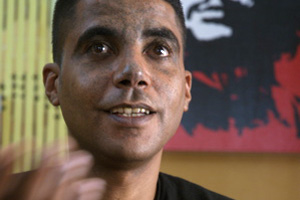 We went to Tulkarem by taxi and in good mood because we had just been to a yoga class. My job was to hold the microphone. Żwirek laughed it was the first time he had a half-deaf sound assistant. We cruised around Tulkarem trying to find the address, nervously trying to confirm the interview, to no avail. Everyone showed us a different direction, Shifa’s brother suddenly started changing the dates. In the end we parked in some bushes and waited in the terrible heat… And, as it usually happens in Palestine, suddenly everything became possible. Someone finally showed us her flat, the interview, confirmed a hundred times before, was finally given a go-ahead. Shifa came with her brother who long quizzed us about where we were from and what the film was for. Then he told Shifa in Palestinian to keep the details to herself. He didn’t trust Leslie.
We went to Tulkarem by taxi and in good mood because we had just been to a yoga class. My job was to hold the microphone. Żwirek laughed it was the first time he had a half-deaf sound assistant. We cruised around Tulkarem trying to find the address, nervously trying to confirm the interview, to no avail. Everyone showed us a different direction, Shifa’s brother suddenly started changing the dates. In the end we parked in some bushes and waited in the terrible heat… And, as it usually happens in Palestine, suddenly everything became possible. Someone finally showed us her flat, the interview, confirmed a hundred times before, was finally given a go-ahead. Shifa came with her brother who long quizzed us about where we were from and what the film was for. Then he told Shifa in Palestinian to keep the details to herself. He didn’t trust Leslie.  The interview was a torture. We were treated with official Palestinian political pulp. Shifa’s father circled around us like a moth, her brother sit next to her all the time, controlling every word. Perhaps because he is in Hamas and Shifa works for Fatah? Or because he is envious of her fame, of all the journalists who come to their home, who do everything to hear her life’s story? It was a pity because the story is interesting. The horror of the second intifada caused Shifa to decide to become a suicide bomber, even though she had a baby daughter. On the critical night, at dawn, right before she was to leave, they banged on the door. A Palestinian collaborator had betrayed her. She got six years. While in prison, she learned Hebrew, got to know her Israeli guard. Now she works for an organisation that helps former prisoners. 19.04.08
The interview was a torture. We were treated with official Palestinian political pulp. Shifa’s father circled around us like a moth, her brother sit next to her all the time, controlling every word. Perhaps because he is in Hamas and Shifa works for Fatah? Or because he is envious of her fame, of all the journalists who come to their home, who do everything to hear her life’s story? It was a pity because the story is interesting. The horror of the second intifada caused Shifa to decide to become a suicide bomber, even though she had a baby daughter. On the critical night, at dawn, right before she was to leave, they banged on the door. A Palestinian collaborator had betrayed her. She got six years. While in prison, she learned Hebrew, got to know her Israeli guard. Now she works for an organisation that helps former prisoners. 19.04.08 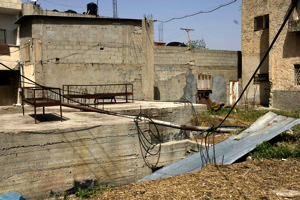 Entropy, chaos. Nothing works. It’s time for the workshop and a group of kids charge on stage, they want to dance dabke, the Palestinian national dance, boring like any other folk dance. Some aims a drilling machine at me, the kids repeat ‘What’s your name, fuck you’ like a mantra, someone enters, someone leaves, a UN delegation arrives and leaves. The Bad Boys turn up only to disappear around the corner, we call for a taxi to take them out of town and have to call it off because someone from the group is missing. Undulations of energy that everyone surrenders to, a constant exchange of useless information. Even if we plan something for 11 a.m., we’ll probably have to wait until 2 p.m. for someone to get back from work, eat their falafel, arrive from home… There’s no division here between the private and public spheres. If something is public, it will be absorbed as private or destroyed. Hence public space is a domain of chaos, dirt and trash. The Freedom Theatre has become such an absorbed space where all boundaries have become blurry. You can see teenagers sitting on stage and smoking cigarettes, lying on the floor in the rehearsal room and listening to music from their mobile phones. They treat the theatre like their own home and every time you need to use special measures to generate the minimum of distance, a minimum of parentheses necessary to establish a symbolic space.
Entropy, chaos. Nothing works. It’s time for the workshop and a group of kids charge on stage, they want to dance dabke, the Palestinian national dance, boring like any other folk dance. Some aims a drilling machine at me, the kids repeat ‘What’s your name, fuck you’ like a mantra, someone enters, someone leaves, a UN delegation arrives and leaves. The Bad Boys turn up only to disappear around the corner, we call for a taxi to take them out of town and have to call it off because someone from the group is missing. Undulations of energy that everyone surrenders to, a constant exchange of useless information. Even if we plan something for 11 a.m., we’ll probably have to wait until 2 p.m. for someone to get back from work, eat their falafel, arrive from home… There’s no division here between the private and public spheres. If something is public, it will be absorbed as private or destroyed. Hence public space is a domain of chaos, dirt and trash. The Freedom Theatre has become such an absorbed space where all boundaries have become blurry. You can see teenagers sitting on stage and smoking cigarettes, lying on the floor in the rehearsal room and listening to music from their mobile phones. They treat the theatre like their own home and every time you need to use special measures to generate the minimum of distance, a minimum of parentheses necessary to establish a symbolic space. 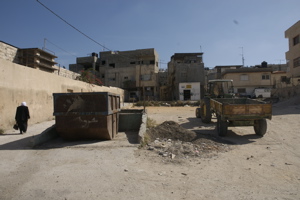 Yesterday Leslie, an American making a documentary about Palestine, decided to make an interview with a would-be woman suicide bomber from Tulkarem. She had been trying to get a date for that interview for two weeks, calling everyday. Finally yesterday we got into a taxi – Żwirek was to shoot the whole thing, Tarek from the theatre was to translate, and I wanted to listen. Right after we left town we got a call that the girl’s brother had decided there’s be no interview because she had to go to Ramallah for a visa to Lebanon. Why her brother? Why on Friday which is the Moslem holiday and all offices are closed? Why all earlier arrangements had suddenly become invalid…? It was all unclear. We turned out. Boris, a filmmaker from Berlin, hung around the theatre for two weeks for the sole purpose of meeting Ahmad, the protagonist of his film. He has been filming him for a couple of years now. But Ahmad never showed up, never called back. Boris went back to Berlin. Everything is uncertain, unclear, blurry… Time flows differently, there are no plans because no one believes anything can be planned. There are no structures, no framework, no skeleton. There’s only meat. People, hundreds, thousands of people wandering around and trying to survive at all cost, but never asking themselves how to do it.
Yesterday Leslie, an American making a documentary about Palestine, decided to make an interview with a would-be woman suicide bomber from Tulkarem. She had been trying to get a date for that interview for two weeks, calling everyday. Finally yesterday we got into a taxi – Żwirek was to shoot the whole thing, Tarek from the theatre was to translate, and I wanted to listen. Right after we left town we got a call that the girl’s brother had decided there’s be no interview because she had to go to Ramallah for a visa to Lebanon. Why her brother? Why on Friday which is the Moslem holiday and all offices are closed? Why all earlier arrangements had suddenly become invalid…? It was all unclear. We turned out. Boris, a filmmaker from Berlin, hung around the theatre for two weeks for the sole purpose of meeting Ahmad, the protagonist of his film. He has been filming him for a couple of years now. But Ahmad never showed up, never called back. Boris went back to Berlin. Everything is uncertain, unclear, blurry… Time flows differently, there are no plans because no one believes anything can be planned. There are no structures, no framework, no skeleton. There’s only meat. People, hundreds, thousands of people wandering around and trying to survive at all cost, but never asking themselves how to do it. 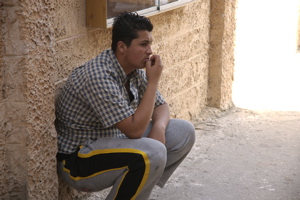 Palestine is a great cage, a huge prison, generating a sense of tension, hopelessness and depression in people. Every potential movement meets with resistance. Israel has really succeeded in destroying this country. Because it was impossible to do the workshop today, I took the boys up on the roof to interview them. ‘What is Israel?’ I ask. ‘Nothing.’ A moment of silence and then, ‘Israel is destruction, devastation.’ ‘Do you know any Israelis?’ ‘No, only soldiers. I know Juliano, but he’s half-Palestinian.’ ‘They’ve killed by brothers, deprived me of my childhood.’ ‘Where is Israel?’ I ask. ‘Everywhere, here and there. In fact, it’s here, because even the Jenin refugee camp is Israel, they’ve taken even this away from us.’ ‘What’s your biggest dream?’ ‘To see the sea.’ 18.04.08
Palestine is a great cage, a huge prison, generating a sense of tension, hopelessness and depression in people. Every potential movement meets with resistance. Israel has really succeeded in destroying this country. Because it was impossible to do the workshop today, I took the boys up on the roof to interview them. ‘What is Israel?’ I ask. ‘Nothing.’ A moment of silence and then, ‘Israel is destruction, devastation.’ ‘Do you know any Israelis?’ ‘No, only soldiers. I know Juliano, but he’s half-Palestinian.’ ‘They’ve killed by brothers, deprived me of my childhood.’ ‘Where is Israel?’ I ask. ‘Everywhere, here and there. In fact, it’s here, because even the Jenin refugee camp is Israel, they’ve taken even this away from us.’ ‘What’s your biggest dream?’ ‘To see the sea.’ 18.04.08  Nabeel has been granted the Japanese visa and his four-month ordeal involving the Japanese bureaucracy/embassy/forms and signatures has come to an end. The paradox is that Nabeel going to Tokyo only to, as he says himself, pick up his second half – a half of himself, in love with Japan – and bring it back to Jenin. He’s got a girlfriend in Tokyo, Kyoko, and he wants to end the relationship. His girlfriend has never been to Palestine, she doesn’t know what Israeli occupation is. Once Nabeel got stuck at a checkpoint. Kyoko happened to call him. ‘Where are you?’ she asked. ‘Go home! Why don’t you just go home?’ she pressed. Securing the Japanese visa when you’re Palestinian verges on the miraculous. The embassies are in Tel Aviv. To get there you need a special permit or, say, an Israeli work permit. An ordinary mortal won’t do it. This is yet another, and highly effective, strategy of preventing the Palestinians from travelling. Israel has done everything it can to turn the West Bank into a ghetto. Let alone the Gaza Strip. The day before yesterday an Israeli APC rolled through the camp. The boys threw stones at it. In the evening one of them showed us a grenade fuse he had found on the street. The IDF [Israeli Defence Force] came to arrest a member of the Al-Aqsa Martyrs’ Brigades, a friend of Zacharia Zubeidi. Zacharia is the only member of Arna Mer-Khamis’s theatre who survived the second intifada. He, his brother Daoud and four other little boys were the core of the theatre group. His mother, Samira, made the upper floor of her house available for rehearsals. Many volunteers from Israel visited the place. She was shot by an Israeli soldier during the invasion. The thirteen-year-old Zacharia was shot in the leg for throwing stones at tanks. At the age of fourteen, he was imprisoned for six months and then again, for four and half years.
Nabeel has been granted the Japanese visa and his four-month ordeal involving the Japanese bureaucracy/embassy/forms and signatures has come to an end. The paradox is that Nabeel going to Tokyo only to, as he says himself, pick up his second half – a half of himself, in love with Japan – and bring it back to Jenin. He’s got a girlfriend in Tokyo, Kyoko, and he wants to end the relationship. His girlfriend has never been to Palestine, she doesn’t know what Israeli occupation is. Once Nabeel got stuck at a checkpoint. Kyoko happened to call him. ‘Where are you?’ she asked. ‘Go home! Why don’t you just go home?’ she pressed. Securing the Japanese visa when you’re Palestinian verges on the miraculous. The embassies are in Tel Aviv. To get there you need a special permit or, say, an Israeli work permit. An ordinary mortal won’t do it. This is yet another, and highly effective, strategy of preventing the Palestinians from travelling. Israel has done everything it can to turn the West Bank into a ghetto. Let alone the Gaza Strip. The day before yesterday an Israeli APC rolled through the camp. The boys threw stones at it. In the evening one of them showed us a grenade fuse he had found on the street. The IDF [Israeli Defence Force] came to arrest a member of the Al-Aqsa Martyrs’ Brigades, a friend of Zacharia Zubeidi. Zacharia is the only member of Arna Mer-Khamis’s theatre who survived the second intifada. He, his brother Daoud and four other little boys were the core of the theatre group. His mother, Samira, made the upper floor of her house available for rehearsals. Many volunteers from Israel visited the place. She was shot by an Israeli soldier during the invasion. The thirteen-year-old Zacharia was shot in the leg for throwing stones at tanks. At the age of fourteen, he was imprisoned for six months and then again, for four and half years. 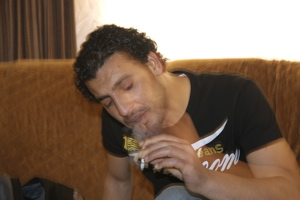 When his brother, Taha, died, his mother bled to death, his second brother, Daoud, was sentenced to sixteen years’ imprisonment, and when none of the Israelis who had come so gladly to visit his mother’s home made contact with him, Zacharia joined the Al-Aqsa Martyrs’ Brigades. The organisation is responsible for many suicide bombings and attacks against IDF forces. It has been designated a terrorist group. The Israeli have tried several times to assassinate Zacharia, shooting five Palestinians, including a fourteen-year-old boy, during one of such attempts. Zacharia has not been captured so far but, as the theatre people say, he’s living on ‘borrowed time.’
When his brother, Taha, died, his mother bled to death, his second brother, Daoud, was sentenced to sixteen years’ imprisonment, and when none of the Israelis who had come so gladly to visit his mother’s home made contact with him, Zacharia joined the Al-Aqsa Martyrs’ Brigades. The organisation is responsible for many suicide bombings and attacks against IDF forces. It has been designated a terrorist group. The Israeli have tried several times to assassinate Zacharia, shooting five Palestinians, including a fourteen-year-old boy, during one of such attempts. Zacharia has not been captured so far but, as the theatre people say, he’s living on ‘borrowed time.’ 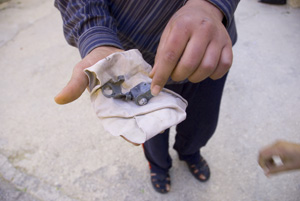 We’ve been through a workshop crisis. I asked the Bad Boys to show themselves to me at a critical moment, a moment when their life changes forever. Perhaps it was not the right day, or moment, or perhaps they’ve just had too much trauma and try to avoid it. Something eludes them, they miss themselves or act out mawkish scenes. Only Rame, who suddenly started to stutter, signalled that way that something had really happened to him. I decided to change my strategy. On the next day we went to a hill out of town. We took plasticine, shovels and a pickaxe.
We’ve been through a workshop crisis. I asked the Bad Boys to show themselves to me at a critical moment, a moment when their life changes forever. Perhaps it was not the right day, or moment, or perhaps they’ve just had too much trauma and try to avoid it. Something eludes them, they miss themselves or act out mawkish scenes. Only Rame, who suddenly started to stutter, signalled that way that something had really happened to him. I decided to change my strategy. On the next day we went to a hill out of town. We took plasticine, shovels and a pickaxe. 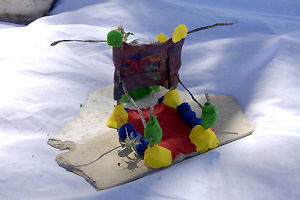 First the boys used plasticine to sculpt their fears and anxieties. Nabeel made a spiral and himself in its centre, Rame – a castle full of horrors, with a snake on the roof, Tubassi – a barrier and his life on its two sides, with thistles on one side and thistles and flowers on the other, and Qais – green fire and himself standing above it.
First the boys used plasticine to sculpt their fears and anxieties. Nabeel made a spiral and himself in its centre, Rame – a castle full of horrors, with a snake on the roof, Tubassi – a barrier and his life on its two sides, with thistles on one side and thistles and flowers on the other, and Qais – green fire and himself standing above it. 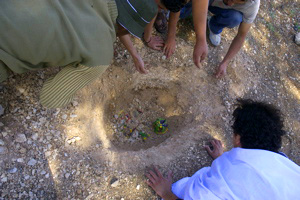 Then we went under a big pine tree and the Bad Boys started digging a hole. It was supposed to be just a small hole but it grew bigger, until you could easily crouch in it. The Middle Eastern earth is so rocky it took us nearly an hour. They worked with the pickaxe, shovelled the earth and sang. It was like rebuilding Warsaw after WWII or the kibbutz pioneer songs. They sang of Palestine. Then they brought their plasticine fears, put them delicately in the hole and buried them in the grave. I say ‘grave’ because they suddenly started bringing stones, surrounded the mound with a stone circle, one of them took a long stick and they started making funeral speeches. That the mission had ended and time had come for the new, that things would get better. Everyone said something. The rest applauded. Then, hooting and shaking rhythmically, we danced a dance around the ‘grave.’ And then, at Ahmad Tubassi’s signal, we ran away, screaming. 16.04.08 ‘I talked to him over the phone, he wanted to get married once he got out. They broke his arm and leg, his skull was fractured in three places, that’s at least what the autopsy showed. And someone like that would decide to hang himself?’ Nabeel was saying, remembering his school mate. The Israelis hanged him. We are in a café. Nabeel has tears in his eyes.
Then we went under a big pine tree and the Bad Boys started digging a hole. It was supposed to be just a small hole but it grew bigger, until you could easily crouch in it. The Middle Eastern earth is so rocky it took us nearly an hour. They worked with the pickaxe, shovelled the earth and sang. It was like rebuilding Warsaw after WWII or the kibbutz pioneer songs. They sang of Palestine. Then they brought their plasticine fears, put them delicately in the hole and buried them in the grave. I say ‘grave’ because they suddenly started bringing stones, surrounded the mound with a stone circle, one of them took a long stick and they started making funeral speeches. That the mission had ended and time had come for the new, that things would get better. Everyone said something. The rest applauded. Then, hooting and shaking rhythmically, we danced a dance around the ‘grave.’ And then, at Ahmad Tubassi’s signal, we ran away, screaming. 16.04.08 ‘I talked to him over the phone, he wanted to get married once he got out. They broke his arm and leg, his skull was fractured in three places, that’s at least what the autopsy showed. And someone like that would decide to hang himself?’ Nabeel was saying, remembering his school mate. The Israelis hanged him. We are in a café. Nabeel has tears in his eyes.  ‘I can’t utter a single line when an Israeli actor stands next to me. I just can’t. They’ve killed four friends of mine, one is in jail. They beat me up when I was ten years old, put me in jail for the night. My mother had to pay 500 shekels to get me back.’ ‘Our home was in Iraq al Manshah. Today the place is called Kiryat Gat, the Arab name officially doesn’t exist. My grandmother took me there. Showed me that house, its door, the garden. And then we got back to our refugee camp near Bethlehem, to Aroup Camp.’
‘I can’t utter a single line when an Israeli actor stands next to me. I just can’t. They’ve killed four friends of mine, one is in jail. They beat me up when I was ten years old, put me in jail for the night. My mother had to pay 500 shekels to get me back.’ ‘Our home was in Iraq al Manshah. Today the place is called Kiryat Gat, the Arab name officially doesn’t exist. My grandmother took me there. Showed me that house, its door, the garden. And then we got back to our refugee camp near Bethlehem, to Aroup Camp.’ 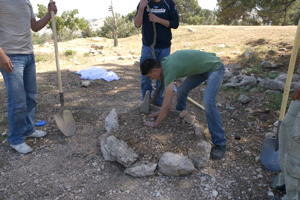 In the afternoon we went to Qais’s because Qais took offence with Jonathan and didn’t want to go to the workshop. Accompanied by bunches of children, escorted by Nabeel and the Bad Boys, we ventured deep into the camp’s winding streets that we would have no chance to visit on our own. Near the mosque we saw a beautiful mural – a hand holding a pencil against a row of mosques, plus a candle. Or hands sticking out of the hellish depths, and between them a hear, the Koran, a broken chain, and a red sun above it all. Then we visited an elderly gentleman who a couple days ago set up a tent by the road, lined it with straw and made a roof with carpets. Now he spends whole days there, catnapping. I thought he maybe had some shamanic properties but it turned out he was waiting for melons that he would start selling in a couple of days.
In the afternoon we went to Qais’s because Qais took offence with Jonathan and didn’t want to go to the workshop. Accompanied by bunches of children, escorted by Nabeel and the Bad Boys, we ventured deep into the camp’s winding streets that we would have no chance to visit on our own. Near the mosque we saw a beautiful mural – a hand holding a pencil against a row of mosques, plus a candle. Or hands sticking out of the hellish depths, and between them a hear, the Koran, a broken chain, and a red sun above it all. Then we visited an elderly gentleman who a couple days ago set up a tent by the road, lined it with straw and made a roof with carpets. Now he spends whole days there, catnapping. I thought he maybe had some shamanic properties but it turned out he was waiting for melons that he would start selling in a couple of days. 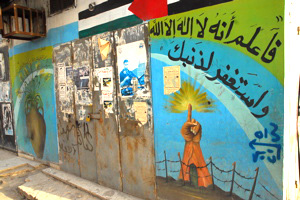 Yesterday in the workshop we met with ghosts. Each of the Bad Boys with their own. The boys wouldn’t show them their face. Some sniffed the ghosts to say goodbye to them, put feet on their feet. The ghosts didn’t respond – reacted neither to a glass of water, nor to touch, nor even to acts of self-aggression. Qais, unable to contact the ghost, covered his eyes, rested his head on the ghost’s arm. We re-enacted one of such actions with the group. Each of the Bad Boys repeated Rame’s gestures. It looked like clumsy choreography. 13.04.08 I am having the headaches again. Running on painkillers. After each session I feel that something is happening with my brain. Something strange. And then pain starts splitting my head.
Yesterday in the workshop we met with ghosts. Each of the Bad Boys with their own. The boys wouldn’t show them their face. Some sniffed the ghosts to say goodbye to them, put feet on their feet. The ghosts didn’t respond – reacted neither to a glass of water, nor to touch, nor even to acts of self-aggression. Qais, unable to contact the ghost, covered his eyes, rested his head on the ghost’s arm. We re-enacted one of such actions with the group. Each of the Bad Boys repeated Rame’s gestures. It looked like clumsy choreography. 13.04.08 I am having the headaches again. Running on painkillers. After each session I feel that something is happening with my brain. Something strange. And then pain starts splitting my head. 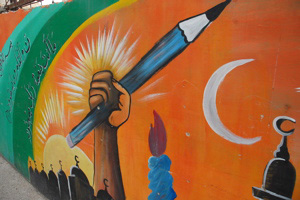 The house where we live with Żwirek is Adnan’s third house in the same place. The former two were destroyed by Israeli bulldozers. Adnan rebuilt one, then the other. He has someone to do it for – five children and his wide, Hijam. Two of his brothers died in the intifada, one shot when standing on the street. Two are in Israeli prison, one doing a 16-year sentence. Adnan himself was tied to a bulldozer, his hands handcuffed at the back, his eyes covered. He was to call his brother who was hiding in the attic of one of the houses in the camp. He called. And because his brother didn’t reply, the bulldozer destroyed the guest room. Adnan kept calling, the bulldozer rode into the kitchen. In the adjacent room lay Yaseen, then ten years old, with whom I do the workshop now. His father, who had fled the house in terror, came back for him facing the Israelis pointing machine guns at him. He reached the house, fetched Yaseen and ran away. Since that time Yaseen has shown all symptoms of PTSD, or post-traumatic stress disorder. Juliano laughs that Yaseen has nothing between the cerebellum and the cortex. Next to another of my Bad Boys, Rame, a missile exploded. He took several years to recover from shock, didn’t speak. Now he is a bunch of meat with human reflexes. He will sometimes let out a growl, sometimes he will say something.
The house where we live with Żwirek is Adnan’s third house in the same place. The former two were destroyed by Israeli bulldozers. Adnan rebuilt one, then the other. He has someone to do it for – five children and his wide, Hijam. Two of his brothers died in the intifada, one shot when standing on the street. Two are in Israeli prison, one doing a 16-year sentence. Adnan himself was tied to a bulldozer, his hands handcuffed at the back, his eyes covered. He was to call his brother who was hiding in the attic of one of the houses in the camp. He called. And because his brother didn’t reply, the bulldozer destroyed the guest room. Adnan kept calling, the bulldozer rode into the kitchen. In the adjacent room lay Yaseen, then ten years old, with whom I do the workshop now. His father, who had fled the house in terror, came back for him facing the Israelis pointing machine guns at him. He reached the house, fetched Yaseen and ran away. Since that time Yaseen has shown all symptoms of PTSD, or post-traumatic stress disorder. Juliano laughs that Yaseen has nothing between the cerebellum and the cortex. Next to another of my Bad Boys, Rame, a missile exploded. He took several years to recover from shock, didn’t speak. Now he is a bunch of meat with human reflexes. He will sometimes let out a growl, sometimes he will say something. 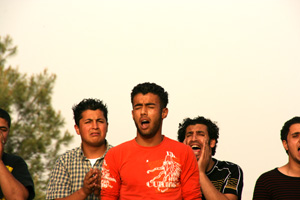 When Adnan found out we walked back through camp with Juliano at 3 a.m. last night, both drunk, he froze. Mohammad, our computer network guy, froze too. ‘Never do it again,’ said Adnan. The Israeli patrol the camp at night, they will shoot if unsure whether someone is not a suicide bomber. In the best case, they will tell you to undress to see what you have around the waist. Jonathan recently walked home almost naked. Weight. All this is crushing down on me. I took the Bad Boys to the hills yesterday, otherwise the camp kids would throw stones at us. I thought we’d relax a little, free ourselves from the trauma. We got out of the car, I saw an empty rectangular, man-made square. It turned out it was from here that the Israeli army shelled Jenin.
When Adnan found out we walked back through camp with Juliano at 3 a.m. last night, both drunk, he froze. Mohammad, our computer network guy, froze too. ‘Never do it again,’ said Adnan. The Israeli patrol the camp at night, they will shoot if unsure whether someone is not a suicide bomber. In the best case, they will tell you to undress to see what you have around the waist. Jonathan recently walked home almost naked. Weight. All this is crushing down on me. I took the Bad Boys to the hills yesterday, otherwise the camp kids would throw stones at us. I thought we’d relax a little, free ourselves from the trauma. We got out of the car, I saw an empty rectangular, man-made square. It turned out it was from here that the Israeli army shelled Jenin. 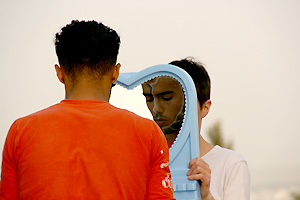 So we called those who were missing. Each one of them has someone like that. We called those who lie in graves, those who are surely in heaven, we even called the city of Beirut. We had learned to shout before since it’s not an easy thing. Your shout has to start in the tips of your toes. We heard yesterday how the tonnes of our screaming interpenetrated, modulated themselves, how words changed colour. Echo reverberated from the hill. Then I asked them to each remember a suicide bomber. And to try and impersonate them. Kamal wrapped himself up in a blanket, painted his face blue, white and black, then simply stood under a tree and shook his head to indicate protest. After the workshop he climbed to the very top of that tree and started playing the fool, shouting, picking cones, acting a chicken, a monkey, who knows what.
So we called those who were missing. Each one of them has someone like that. We called those who lie in graves, those who are surely in heaven, we even called the city of Beirut. We had learned to shout before since it’s not an easy thing. Your shout has to start in the tips of your toes. We heard yesterday how the tonnes of our screaming interpenetrated, modulated themselves, how words changed colour. Echo reverberated from the hill. Then I asked them to each remember a suicide bomber. And to try and impersonate them. Kamal wrapped himself up in a blanket, painted his face blue, white and black, then simply stood under a tree and shook his head to indicate protest. After the workshop he climbed to the very top of that tree and started playing the fool, shouting, picking cones, acting a chicken, a monkey, who knows what. 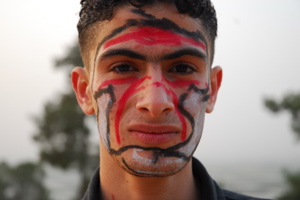 The big fat Rame made himself a tiny bag, put stones there, lipsticks, a black bandana. He painted his face black, with red outlines around the ‘mask.’ Then he carried the bag for a while, went to the side and buried everything he had in the bag in a small grave which he covered with flat stones. All these scenes were dominated by a sense of resignation, non-acceptance, farewell. There was no heroism of the martyrs, as the suicide bombers are called in Palestine. There was only powerlessness, inaction, lack of alternative. 12.04.08 ‘You can’t use the words “Israeli camp,”‘ a Haaretz journalist told me. ‘You have to say “refugee camp,” otherwise it sounds like Auschwitz.’ ‘But it’s your camp…’ I couldn’t find the right words, ‘…in a way, you set it up.’ ‘That’s nothing,’ Nabeel said. ‘An American journalist once came to Jenin and asked me where I lived. “In a camp,” I said. “Oh, you’re camping here!” he smiled broadly.’
The big fat Rame made himself a tiny bag, put stones there, lipsticks, a black bandana. He painted his face black, with red outlines around the ‘mask.’ Then he carried the bag for a while, went to the side and buried everything he had in the bag in a small grave which he covered with flat stones. All these scenes were dominated by a sense of resignation, non-acceptance, farewell. There was no heroism of the martyrs, as the suicide bombers are called in Palestine. There was only powerlessness, inaction, lack of alternative. 12.04.08 ‘You can’t use the words “Israeli camp,”‘ a Haaretz journalist told me. ‘You have to say “refugee camp,” otherwise it sounds like Auschwitz.’ ‘But it’s your camp…’ I couldn’t find the right words, ‘…in a way, you set it up.’ ‘That’s nothing,’ Nabeel said. ‘An American journalist once came to Jenin and asked me where I lived. “In a camp,” I said. “Oh, you’re camping here!” he smiled broadly.’ 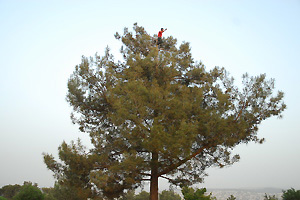 We came back with Żwirek from Tel Aviv, through Jerusalem, Kalandia checkpoint, Ramallah. It was Friday, a holiday, so everything took even longer than usual. Żwirek carried a large suitcase with a camera, his dreamed-of Sony Z1, hoods and lipsticks in many colours for our exercises, and an XXL backpack. Everyone greeted him warmly. We decided to show here Żwirek’s film about the palm tree from last year. Today, during the workshop, something really happened. For the first time since our arrival in Jenin I felt we participated in something real. For reasons unclear, the Bad Boys first started fighting, jumping on each other, pummelling one another. Then they pulled me into this, I was quickly overcome, downed. I struggled, but to no avail. Then was a dance, breathing, relaxation. For the first time the sessions are filmed – by Żwirek, of course.
We came back with Żwirek from Tel Aviv, through Jerusalem, Kalandia checkpoint, Ramallah. It was Friday, a holiday, so everything took even longer than usual. Żwirek carried a large suitcase with a camera, his dreamed-of Sony Z1, hoods and lipsticks in many colours for our exercises, and an XXL backpack. Everyone greeted him warmly. We decided to show here Żwirek’s film about the palm tree from last year. Today, during the workshop, something really happened. For the first time since our arrival in Jenin I felt we participated in something real. For reasons unclear, the Bad Boys first started fighting, jumping on each other, pummelling one another. Then they pulled me into this, I was quickly overcome, downed. I struggled, but to no avail. Then was a dance, breathing, relaxation. For the first time the sessions are filmed – by Żwirek, of course. 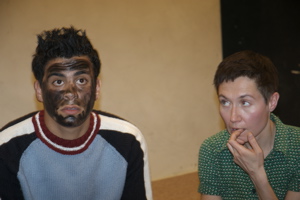 And then we went to the rehearsal room where there is a mirror. I asked them to remember their dreams but to not talk about them. I gave them lipsticks in various colours. They stood in front of the mirror in turns. They painted their face and then, with a movement, gesture, jerk, showed their dream, becoming themselves from the dream. We tried to guess what the dream was about, who they were in it. Yaseen painted his face black. Him, the joker, the coolest guy in the group. He’s arrogant because he’s been left alone, his two brothers died in the intifada. It’s him I expelled from the group… Yaseen his behind a partition, stuck out his head, withdrew it, and then, with his back against the wall, started making strange gestures, thrashing about in all directions. I can’t really describe what the gestures showed but we quailed at the sight. Then the responses came: Yaseen is afraid of himself, afraid of his father, afraid of life. He lowered his head, covered his eyes.
And then we went to the rehearsal room where there is a mirror. I asked them to remember their dreams but to not talk about them. I gave them lipsticks in various colours. They stood in front of the mirror in turns. They painted their face and then, with a movement, gesture, jerk, showed their dream, becoming themselves from the dream. We tried to guess what the dream was about, who they were in it. Yaseen painted his face black. Him, the joker, the coolest guy in the group. He’s arrogant because he’s been left alone, his two brothers died in the intifada. It’s him I expelled from the group… Yaseen his behind a partition, stuck out his head, withdrew it, and then, with his back against the wall, started making strange gestures, thrashing about in all directions. I can’t really describe what the gestures showed but we quailed at the sight. Then the responses came: Yaseen is afraid of himself, afraid of his father, afraid of life. He lowered his head, covered his eyes.  There was a lot of aggression in their dreams: they thrashed around, pummelled themselves, fell on the floor, ran around like animals in a cage, passed the door as if it wasn’t there. They harmed rather than decorated themselves with the lipsticks. And in the end the big fat Rame came out, painted red. He growled and started swallowing something, he belched, swallowed something again, and we, who knows why, suddenly started laughing hard, rolling around on the floor, roaring, catching our breath and then laughing again. It turned out he dreamed he was in a forest and was swallowing snakes. 9.04.08 I’m in Haifa. Two hours by car from Jenin but it’s like a cosmic distance. I feel like I’ve left a stifling closed room. We changed cars again – Palestinian plates, Israeli plates, a star of David with a dove of peace at the checkpoint, removed immediately afterwards. I’m at Juliano’s home, on a hill, in a small guest room in which the only thing besides the four walls is a mattress.
There was a lot of aggression in their dreams: they thrashed around, pummelled themselves, fell on the floor, ran around like animals in a cage, passed the door as if it wasn’t there. They harmed rather than decorated themselves with the lipsticks. And in the end the big fat Rame came out, painted red. He growled and started swallowing something, he belched, swallowed something again, and we, who knows why, suddenly started laughing hard, rolling around on the floor, roaring, catching our breath and then laughing again. It turned out he dreamed he was in a forest and was swallowing snakes. 9.04.08 I’m in Haifa. Two hours by car from Jenin but it’s like a cosmic distance. I feel like I’ve left a stifling closed room. We changed cars again – Palestinian plates, Israeli plates, a star of David with a dove of peace at the checkpoint, removed immediately afterwards. I’m at Juliano’s home, on a hill, in a small guest room in which the only thing besides the four walls is a mattress. 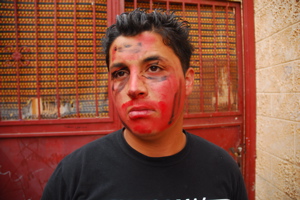 I couldn’t sleep last night, had the classic war nightmares: shooting, running away, fear, I woke up all sweaty. Afterimages. A column of civilian cars rode through Jenin yesterday, the men sat outside the open windows and fired repeatedly in the air. Nabeel said, ‘That’s what the Palestinians do best – shoot in the air.’ And we went slowly our way, to a cake shop, for Lipton tea and some excellent cakes. Three soldiers died in Gaza, the Israeli killed four kids for dessert. Juliano got really angry today. Only two of the Bad Boys came for the workshop today. Enough of this, he said. You won’t be doing a workshop for two idiots. I will, I replied. I see no reason why I shouldn’t. I took the boys and we went to the theatre, followed by American journalists. I felt like an animal in a pen at the zoo. A lama or something like that. Fortunately, Juliano soon took them away. Jonathan Stanczak, who founded the theatre with Juliano, arrived from Sweden today, and Martin from Cambridge, who is to run a photographic workshop, is here too. The small flat in which I lived on my own for the last week is suddenly full of people. ‘Is this why people from all over the world, professionals, come here, to waste their time for a bunch of demented assholes? Do I, being fifty years old, have to shout at some idiot? This theatre is a mistake, it’s the greatest mistake of my life,’ Juliano roared. It looks like the theatre has to change its strategy. It’s the kids who must WANT at all cost to be part of this place, now they just spend time here. As everything and everyone in Palestine, they just want to make it through, waiting for someone to give them something: the UNRWA some flour and the activists some entertainment. So I tighten the screw. Yaseen’s official apology came this afternoon. I torment the Bad Boys by repeatedly asking the same question. I ask them to stop showing me pictures, playing out scenes, to stop ritualising the situation. 8.04.2008 I soak in, lose the horizon. I feel like I’m in a cage. I internalise, enclose, suck in everything that happens. I have moments of surfacing but rarely. Strangely, these moments happen here, on the theatre’s stage. Usually you need to go out, go somewhere, gain a physical distance towards the place where you usually are. Here everything works the other way round.
I couldn’t sleep last night, had the classic war nightmares: shooting, running away, fear, I woke up all sweaty. Afterimages. A column of civilian cars rode through Jenin yesterday, the men sat outside the open windows and fired repeatedly in the air. Nabeel said, ‘That’s what the Palestinians do best – shoot in the air.’ And we went slowly our way, to a cake shop, for Lipton tea and some excellent cakes. Three soldiers died in Gaza, the Israeli killed four kids for dessert. Juliano got really angry today. Only two of the Bad Boys came for the workshop today. Enough of this, he said. You won’t be doing a workshop for two idiots. I will, I replied. I see no reason why I shouldn’t. I took the boys and we went to the theatre, followed by American journalists. I felt like an animal in a pen at the zoo. A lama or something like that. Fortunately, Juliano soon took them away. Jonathan Stanczak, who founded the theatre with Juliano, arrived from Sweden today, and Martin from Cambridge, who is to run a photographic workshop, is here too. The small flat in which I lived on my own for the last week is suddenly full of people. ‘Is this why people from all over the world, professionals, come here, to waste their time for a bunch of demented assholes? Do I, being fifty years old, have to shout at some idiot? This theatre is a mistake, it’s the greatest mistake of my life,’ Juliano roared. It looks like the theatre has to change its strategy. It’s the kids who must WANT at all cost to be part of this place, now they just spend time here. As everything and everyone in Palestine, they just want to make it through, waiting for someone to give them something: the UNRWA some flour and the activists some entertainment. So I tighten the screw. Yaseen’s official apology came this afternoon. I torment the Bad Boys by repeatedly asking the same question. I ask them to stop showing me pictures, playing out scenes, to stop ritualising the situation. 8.04.2008 I soak in, lose the horizon. I feel like I’m in a cage. I internalise, enclose, suck in everything that happens. I have moments of surfacing but rarely. Strangely, these moments happen here, on the theatre’s stage. Usually you need to go out, go somewhere, gain a physical distance towards the place where you usually are. Here everything works the other way round. 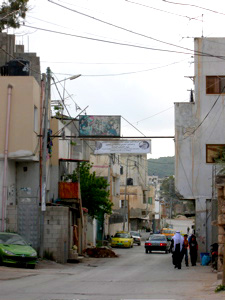 We started dancing today. First we moved our fingers, then hands, then arms, then the whole body, then we started with our toes again. We end by doing a crazy, freestyle version of who knows what. Big relief. We use elements of yoga, shout, do breathing exercises. We tense our bodies and bounce against each other. I devised an exercise with a childhood image, with what they saw outside the window when they were small. I put a window on stage and asked the boys to show in a couple of gestures what happened outside that window ten or fifteen years ago. I had a conflict with one of them today, Yaseen. He’s a big spoiled child. His two brothers died in the intifada, so Yaseen, being the only son, has everything he wants. A car, money, time. He lives in a kind of bubble so little gets through to him. When today he again tried to break the group’s fragile concentration, I turned into a stone. You have a choice, I said, either you stay WITH US, or you leave. He reacted aggressively and left. 6.04.08
We started dancing today. First we moved our fingers, then hands, then arms, then the whole body, then we started with our toes again. We end by doing a crazy, freestyle version of who knows what. Big relief. We use elements of yoga, shout, do breathing exercises. We tense our bodies and bounce against each other. I devised an exercise with a childhood image, with what they saw outside the window when they were small. I put a window on stage and asked the boys to show in a couple of gestures what happened outside that window ten or fifteen years ago. I had a conflict with one of them today, Yaseen. He’s a big spoiled child. His two brothers died in the intifada, so Yaseen, being the only son, has everything he wants. A car, money, time. He lives in a kind of bubble so little gets through to him. When today he again tried to break the group’s fragile concentration, I turned into a stone. You have a choice, I said, either you stay WITH US, or you leave. He reacted aggressively and left. 6.04.08 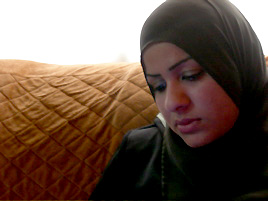 The heat wave has started. There are no thermometers here but I think it’s about 30 degrees Celsius in full shade. Wearing a T-shirt or a knee-length skirt is out of the question. So is rolling up the sleeves. I’m a woman so I must cover everything except my forearms and my face. I can bare my feet but that hardly offers any relief. Rania, May and Hana tell me sometimes to put on a dress covering the jeans but that’s too much for me, I’ll boil if I put on anything else. I ask them how they survive the summer. They wear ankle-length coats, two headscarves wrapped so tightly you don’t see an inch of the neck, plus a skirt under the coat. They say it’s tough. When I ask them why they need to cover themselves so obsessively, the answer is always the same: the camp. Not Islam, but ‘the camp.’ Several hundred yards away, in the city of Jenin, it’s different, but the refugee camp is a breeding ground for extremists.
The heat wave has started. There are no thermometers here but I think it’s about 30 degrees Celsius in full shade. Wearing a T-shirt or a knee-length skirt is out of the question. So is rolling up the sleeves. I’m a woman so I must cover everything except my forearms and my face. I can bare my feet but that hardly offers any relief. Rania, May and Hana tell me sometimes to put on a dress covering the jeans but that’s too much for me, I’ll boil if I put on anything else. I ask them how they survive the summer. They wear ankle-length coats, two headscarves wrapped so tightly you don’t see an inch of the neck, plus a skirt under the coat. They say it’s tough. When I ask them why they need to cover themselves so obsessively, the answer is always the same: the camp. Not Islam, but ‘the camp.’ Several hundred yards away, in the city of Jenin, it’s different, but the refugee camp is a breeding ground for extremists. 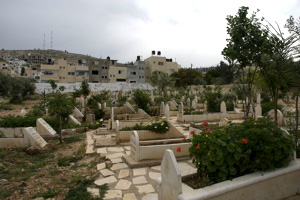 David from London, a yoga teacher, arrived today. He comes from an Ukrainian family of migrant Gypsies. Once they travelled with a circus around Europe. I went with him to the camp to show him the martyrs’ cemetery, a holy place. On almost every grave grows a tiny palm or olive tree, or palm leaves are stuck in it. David slumped, no wonder, the energy of this place is hellish. Right next to the cemetery stand a ruined house and a bullet-riddled off-road car. They say the house’s owners died in that car. It’s been standing like that for years.
David from London, a yoga teacher, arrived today. He comes from an Ukrainian family of migrant Gypsies. Once they travelled with a circus around Europe. I went with him to the camp to show him the martyrs’ cemetery, a holy place. On almost every grave grows a tiny palm or olive tree, or palm leaves are stuck in it. David slumped, no wonder, the energy of this place is hellish. Right next to the cemetery stand a ruined house and a bullet-riddled off-road car. They say the house’s owners died in that car. It’s been standing like that for years. 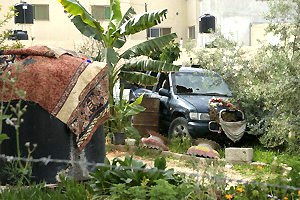 When we left, a bunch of kids surrounded us and never left us alone. Wild little animals, getting every idiot rid of his watch, asking for money and cigarettes. It’s even worse when you’re a woman, they make vulgar gestures and grope your ass. You can contain them but you have to show you’re in authority and bang one of them on the head.
When we left, a bunch of kids surrounded us and never left us alone. Wild little animals, getting every idiot rid of his watch, asking for money and cigarettes. It’s even worse when you’re a woman, they make vulgar gestures and grope your ass. You can contain them but you have to show you’re in authority and bang one of them on the head. 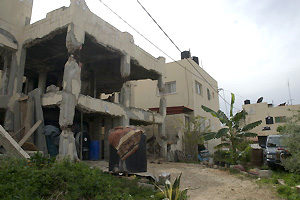 I persuaded Hana to come to the yoga class. It was very hard, a lot of resistance. But when I finally succeeded, the boys started protesting, shouting at her, chasing her out of the rehearsal room, so I gave them a rollicking. But Hana didn’t manage, left after half an hour. Overhead, above all of us, above David, the yoga class, the poor Hana, above the camp kids, Israeli Apache helicopters circled today. 4.04.08 It’s Friday so I have a day off.
I persuaded Hana to come to the yoga class. It was very hard, a lot of resistance. But when I finally succeeded, the boys started protesting, shouting at her, chasing her out of the rehearsal room, so I gave them a rollicking. But Hana didn’t manage, left after half an hour. Overhead, above all of us, above David, the yoga class, the poor Hana, above the camp kids, Israeli Apache helicopters circled today. 4.04.08 It’s Friday so I have a day off. 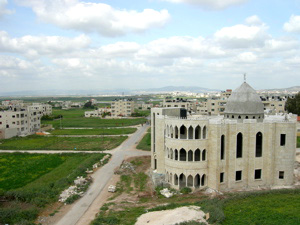 I made some washing on the roof the house since that’s where the washing machine is. A beautiful view of the camp stretches from there. Next to the camp stands an unfinished mosque with a bald concrete dome. In the afternoon I visited Hijam, Adnan’s wife, for tea with meramiya. Then I walked around the camp. I took pictures of images of paradise: I think that’s how the residents of Jenin envision the Jannah. One of the murals showed a drab city landscape, perhaps it was the purgatory. Yesterday at this time I walked with Adnan towards the empty square near the theatre. A screening was held there of videos from six years ago, from the Israeli invasion of Jenin. Dusk was falling, a lot of people came. Whistles, shouts, petards, chaos. Israeli tanks rolled through the screen brought from the theatre, shots were fired, people ran in all directions, funerals turned into demonstrations of despair. Then guns appeared, I recognised Yusuf, Ashraf, Zacharia and Alaa from the theatre. Then the wounded, blood, bandages, funerals, and again the demonstrations, then it became hard to recognise the faces because the fighters began to cover them with black scarves. The viewers screamed at every climax, reliving the experience. Everything is so fresh. After all, it was only six years ago. I remembered Juliano’s words: ‘What would the Palestinians be without the occupation?’ What else binds these people together except their strong family ties and the mosque? Everything here is oriented towards just making it through. And towards cherishing the trauma. That’s why the theatre has such a tough life here. It’s exactly across everything.
I made some washing on the roof the house since that’s where the washing machine is. A beautiful view of the camp stretches from there. Next to the camp stands an unfinished mosque with a bald concrete dome. In the afternoon I visited Hijam, Adnan’s wife, for tea with meramiya. Then I walked around the camp. I took pictures of images of paradise: I think that’s how the residents of Jenin envision the Jannah. One of the murals showed a drab city landscape, perhaps it was the purgatory. Yesterday at this time I walked with Adnan towards the empty square near the theatre. A screening was held there of videos from six years ago, from the Israeli invasion of Jenin. Dusk was falling, a lot of people came. Whistles, shouts, petards, chaos. Israeli tanks rolled through the screen brought from the theatre, shots were fired, people ran in all directions, funerals turned into demonstrations of despair. Then guns appeared, I recognised Yusuf, Ashraf, Zacharia and Alaa from the theatre. Then the wounded, blood, bandages, funerals, and again the demonstrations, then it became hard to recognise the faces because the fighters began to cover them with black scarves. The viewers screamed at every climax, reliving the experience. Everything is so fresh. After all, it was only six years ago. I remembered Juliano’s words: ‘What would the Palestinians be without the occupation?’ What else binds these people together except their strong family ties and the mosque? Everything here is oriented towards just making it through. And towards cherishing the trauma. That’s why the theatre has such a tough life here. It’s exactly across everything. 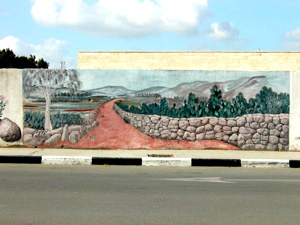 The theatre kids show symptoms of PTSD, post-traumatic stress disorder. If they get emotional, they can’t utter a word, just some inarticulate sounds. Hana runs on psychotropic drugs, so do Rame and Yaseen. Most react violently to everything they can’t handle. My Bad Boys are a lost generation. One can still get a lot out of them but they can no longer be shaped fully, they’ll never get rid of their aggression and instability. That’s probably why they love exercises in which they can scream at will as well as those in which they can show how much they hate their life. They also like everything that relaxes them deeply. But when it comes to stretching their imagination, they have a problem. It’s been getting better by the day, though, we’re closer to each other. I had to modify my behaviour. I keep them on a short leash, partnership being out of the question. There are no chances for partnership here, you need to keep a distance, be warm but absolutely tough. Reportedly only two years ago they weren’t able to last out longer than fifteen minutes indoors.
The theatre kids show symptoms of PTSD, post-traumatic stress disorder. If they get emotional, they can’t utter a word, just some inarticulate sounds. Hana runs on psychotropic drugs, so do Rame and Yaseen. Most react violently to everything they can’t handle. My Bad Boys are a lost generation. One can still get a lot out of them but they can no longer be shaped fully, they’ll never get rid of their aggression and instability. That’s probably why they love exercises in which they can scream at will as well as those in which they can show how much they hate their life. They also like everything that relaxes them deeply. But when it comes to stretching their imagination, they have a problem. It’s been getting better by the day, though, we’re closer to each other. I had to modify my behaviour. I keep them on a short leash, partnership being out of the question. There are no chances for partnership here, you need to keep a distance, be warm but absolutely tough. Reportedly only two years ago they weren’t able to last out longer than fifteen minutes indoors. 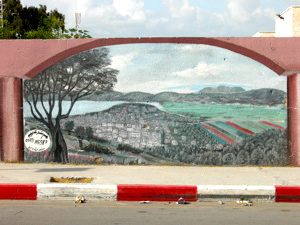 The theatre kids show symptoms of PTSD, post-traumatic stress disorder. If they get emotional, they can’t utter a word, just some inarticulate sounds. Hana runs on psychotropic drugs, so do Rame and Yaseen. Most react violently to everything they can’t handle. My Bad Boys are a lost generation. One can still get a lot out of them but they can no longer be shaped fully, they’ll never get rid of their aggression and instability. That’s probably why they love exercises in which they can scream at will as well as those in which they can show how much they hate their life. They also like everything that relaxes them deeply. But when it comes to stretching their imagination, they have a problem. It’s been getting better by the day, though, we’re closer to each other. I had to modify my behaviour. I keep them on a short leash, partnership being out of the question. There are no chances for partnership here, you need to keep a distance, be warm but absolutely tough. Reportedly only two years ago they weren’t able to last out longer than fifteen minutes indoors.
The theatre kids show symptoms of PTSD, post-traumatic stress disorder. If they get emotional, they can’t utter a word, just some inarticulate sounds. Hana runs on psychotropic drugs, so do Rame and Yaseen. Most react violently to everything they can’t handle. My Bad Boys are a lost generation. One can still get a lot out of them but they can no longer be shaped fully, they’ll never get rid of their aggression and instability. That’s probably why they love exercises in which they can scream at will as well as those in which they can show how much they hate their life. They also like everything that relaxes them deeply. But when it comes to stretching their imagination, they have a problem. It’s been getting better by the day, though, we’re closer to each other. I had to modify my behaviour. I keep them on a short leash, partnership being out of the question. There are no chances for partnership here, you need to keep a distance, be warm but absolutely tough. Reportedly only two years ago they weren’t able to last out longer than fifteen minutes indoors. 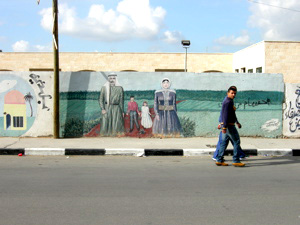 Three days ago Jewish settlers killed a Bar Zeit university student. First they threw stones at cars riding to Ramallah, then fired at them. That’s at least the news that Petra has brought from Ramallah. Petra teaches drama therapy sessions for kids at the theatre. 1.04.08 An invasion of artists at the theatre: filmmakers, aspirants, those who want to make a career on the politically correct Palestinian tragedy. Now I too run away, hiding from them. And I understand what Juliano told me in the car. But there are also those who really search, dig, talk. What am I doing in the midst of all this? Am I not but a noise on the wave of compassion that the art world preaches in unison towards Palestine? The only excuse I have is that I do no specific project here, just trying instead to invent a new means of expression that my Bad Boys will use for their own purposes. The Bad Boys are Nabeel – my alter ego, a great guy (depressed, though, in love with a Japanese girl and waiting in vain for a Japanese visa), you can say we do this workshop together. Delicate and strong at the same time. Then Yaseen, Rame – I have problems with him, he’s like a stone, a big stone (he’s a fatso). Qais, a wild animal, thin like a rake (his chest aches so he can’t do all the exercises), Kastro and Kamal. What I do is aimed at translating words, sentences, phrases, stories into body language – bodily positions, gestures, sounds and movements. When they’re ready, I’ll ask them to tell stories from the second intifada. For now, we’re learning the basics of body language. If someone’s had a bad day, we’re working on showing how bad it was. How to encapsulate a whole day or morning in a gesture, or in taking a run-up and bouncing off the wall, ‘cause such days happen too. We play translating the simplest words into gestures. This isn’t easy for many reasons. What I have in front of myself is a group of proud Palestinian teenagers who’ve done a lot in their lives to never show precisely what I am asking them to show. They cherish a projected self-image that I’m trying to shatter. That they’re cool, insolent, that they never show their emotions. Life has done a lot to let them know they should never be helpless and I’m asking them precisely to be helpless. They have trouble concentrating, being creative, anything. And they love violence, something we stumble over all the time.
Three days ago Jewish settlers killed a Bar Zeit university student. First they threw stones at cars riding to Ramallah, then fired at them. That’s at least the news that Petra has brought from Ramallah. Petra teaches drama therapy sessions for kids at the theatre. 1.04.08 An invasion of artists at the theatre: filmmakers, aspirants, those who want to make a career on the politically correct Palestinian tragedy. Now I too run away, hiding from them. And I understand what Juliano told me in the car. But there are also those who really search, dig, talk. What am I doing in the midst of all this? Am I not but a noise on the wave of compassion that the art world preaches in unison towards Palestine? The only excuse I have is that I do no specific project here, just trying instead to invent a new means of expression that my Bad Boys will use for their own purposes. The Bad Boys are Nabeel – my alter ego, a great guy (depressed, though, in love with a Japanese girl and waiting in vain for a Japanese visa), you can say we do this workshop together. Delicate and strong at the same time. Then Yaseen, Rame – I have problems with him, he’s like a stone, a big stone (he’s a fatso). Qais, a wild animal, thin like a rake (his chest aches so he can’t do all the exercises), Kastro and Kamal. What I do is aimed at translating words, sentences, phrases, stories into body language – bodily positions, gestures, sounds and movements. When they’re ready, I’ll ask them to tell stories from the second intifada. For now, we’re learning the basics of body language. If someone’s had a bad day, we’re working on showing how bad it was. How to encapsulate a whole day or morning in a gesture, or in taking a run-up and bouncing off the wall, ‘cause such days happen too. We play translating the simplest words into gestures. This isn’t easy for many reasons. What I have in front of myself is a group of proud Palestinian teenagers who’ve done a lot in their lives to never show precisely what I am asking them to show. They cherish a projected self-image that I’m trying to shatter. That they’re cool, insolent, that they never show their emotions. Life has done a lot to let them know they should never be helpless and I’m asking them precisely to be helpless. They have trouble concentrating, being creative, anything. And they love violence, something we stumble over all the time. 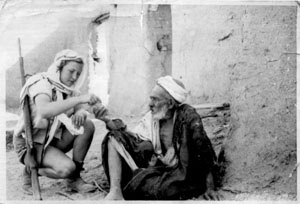 The Freedom Theatre is a continuation of the ideas of Arna Mer-Khamis (1930-1995), born in a Jewish family in Palestine, who fought with the Palmach, the Haganah’s fighting force, during the 1948 Arab-Israeli war. She married Saliba Khamis, a prominent Palestinian member of the Israeli Communist Party. Following the Six Day War, she was arrested many times for participating in demonstrations and protests. During the first intifada, Arna founded the organisation Care and Learning to help children, at first chiefly those in jail, then also those in refugee camps. The organisation helped organise education when the schools were closed (1988-1990). As a teacher by profession, Arna went on weekends with crayons, paper, pigments and brushes to teach kids in the city streets and camps in the Territories. She also wrote a guidebook for women on how to offer substitute education. When she found out that 47 percent of children in Jenin had directly experienced Israeli violence during the first intifada, Arna decided to open four Child Centres – in the city of Jenin and in the camp. Awarded the alternative Nobel prize for peace, she built the Stone Theatre, destroyed during the Israeli invasion of the camp in 2002. Many of ‘her’ children, then in their teens, were either killed in the invasion or carried out suicide attacks in Israel. Juliano Mer Khamis, Arna’s son, founded a new theatre in Jenin, the Freedom Theatre, where I work now. 31.03.08 The first workshop. I’m exhausted. It’s tougher than I though it’d be. I can’t really write about it. I feel like someone’s torn out my liver. I need to be strong. This is a very long-term project. I went from the camp to town. I found a little market that very much resembles hell on earth since every stall is equipped with a blasting loudspeaker. I don’t know what precisely it’s blasting but it surely wants you to buy something. Two kilos of strawberries, juicy, sweet and aromatic, cost just 4 shekels. I was walking back with some humus, pita, yoghurt, tomatoes, loaded down like a pack mule, and suddenly I was speechless. There was a sign saying Poland was financing a water system for Jenin. My Polish heart jumped with joy. Great! I’m reading about Grotowski. The muezzin’s voice outside. 30.03.2008
The Freedom Theatre is a continuation of the ideas of Arna Mer-Khamis (1930-1995), born in a Jewish family in Palestine, who fought with the Palmach, the Haganah’s fighting force, during the 1948 Arab-Israeli war. She married Saliba Khamis, a prominent Palestinian member of the Israeli Communist Party. Following the Six Day War, she was arrested many times for participating in demonstrations and protests. During the first intifada, Arna founded the organisation Care and Learning to help children, at first chiefly those in jail, then also those in refugee camps. The organisation helped organise education when the schools were closed (1988-1990). As a teacher by profession, Arna went on weekends with crayons, paper, pigments and brushes to teach kids in the city streets and camps in the Territories. She also wrote a guidebook for women on how to offer substitute education. When she found out that 47 percent of children in Jenin had directly experienced Israeli violence during the first intifada, Arna decided to open four Child Centres – in the city of Jenin and in the camp. Awarded the alternative Nobel prize for peace, she built the Stone Theatre, destroyed during the Israeli invasion of the camp in 2002. Many of ‘her’ children, then in their teens, were either killed in the invasion or carried out suicide attacks in Israel. Juliano Mer Khamis, Arna’s son, founded a new theatre in Jenin, the Freedom Theatre, where I work now. 31.03.08 The first workshop. I’m exhausted. It’s tougher than I though it’d be. I can’t really write about it. I feel like someone’s torn out my liver. I need to be strong. This is a very long-term project. I went from the camp to town. I found a little market that very much resembles hell on earth since every stall is equipped with a blasting loudspeaker. I don’t know what precisely it’s blasting but it surely wants you to buy something. Two kilos of strawberries, juicy, sweet and aromatic, cost just 4 shekels. I was walking back with some humus, pita, yoghurt, tomatoes, loaded down like a pack mule, and suddenly I was speechless. There was a sign saying Poland was financing a water system for Jenin. My Polish heart jumped with joy. Great! I’m reading about Grotowski. The muezzin’s voice outside. 30.03.2008 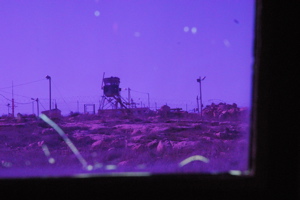 We changed our identity several times on our way to Jenin. Before the checkpoint, we hung a tag with the star of David and a dove of peace on the wing mirror, then we left the car on Israeli plates in one of the villages and changed to a Palestinian taxi, then we spoke English to the Palestinian police, pretending to be complete outsiders. By us I mean Juliano Mer-Khamis, the leader of the Freedom Theatre in Jenin (www.freeedomtheatre.org), Jenny, his wife, a tough girl from Finland, who co-runs the theatre, Linn and Gunnar, also from Finland, here to teach scenography for a couple of days, and myself.
We changed our identity several times on our way to Jenin. Before the checkpoint, we hung a tag with the star of David and a dove of peace on the wing mirror, then we left the car on Israeli plates in one of the villages and changed to a Palestinian taxi, then we spoke English to the Palestinian police, pretending to be complete outsiders. By us I mean Juliano Mer-Khamis, the leader of the Freedom Theatre in Jenin (www.freeedomtheatre.org), Jenny, his wife, a tough girl from Finland, who co-runs the theatre, Linn and Gunnar, also from Finland, here to teach scenography for a couple of days, and myself. 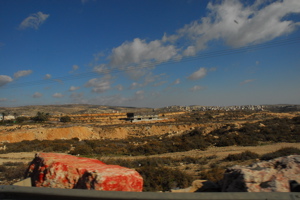 ‘Every penny to the beggar delays the revolution one day,’ laughs Juliano, paraphrasing Marx, to describe how the various NGOs, the UNRWA, the UN and other organisations demoralise the Palestinians, how much the social tissue in the Territories has been destroyed. One more travel cliché – stories of Western or Japanese tourist groups that, as part of their ‘alternative tourism’ package tour, visit Jenin and how the theatre people run away from them. Juliano says some time ago they made fun by demonstrating (to their amusement, in fact) the young actors’ bad teeth to the tourists and explaining to them the disastrous effects of malnutrition and lack of vitamins.
‘Every penny to the beggar delays the revolution one day,’ laughs Juliano, paraphrasing Marx, to describe how the various NGOs, the UNRWA, the UN and other organisations demoralise the Palestinians, how much the social tissue in the Territories has been destroyed. One more travel cliché – stories of Western or Japanese tourist groups that, as part of their ‘alternative tourism’ package tour, visit Jenin and how the theatre people run away from them. Juliano says some time ago they made fun by demonstrating (to their amusement, in fact) the young actors’ bad teeth to the tourists and explaining to them the disastrous effects of malnutrition and lack of vitamins. 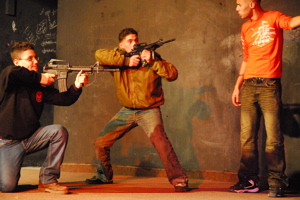 An inner meeting takes place in the evening where important things are said that confirm my tentative intuitions and, in a way, legitimise my presence here. What would the Palestinians be without the occupation? Juliano says. How would they build their identity without the Nakba (the exodus of 1948)? All we have to offer to the West is our misery. We must forget about the outside client waiting for another part of his favourite tragedy. We must take care – for ourselves – of our own stories, problems, ourselves, our here and now. 29.03.2008
An inner meeting takes place in the evening where important things are said that confirm my tentative intuitions and, in a way, legitimise my presence here. What would the Palestinians be without the occupation? Juliano says. How would they build their identity without the Nakba (the exodus of 1948)? All we have to offer to the West is our misery. We must forget about the outside client waiting for another part of his favourite tragedy. We must take care – for ourselves – of our own stories, problems, ourselves, our here and now. 29.03.2008 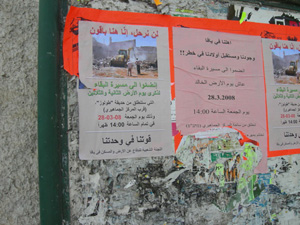 Three days in Tel Aviv. I lost all my emotional distance. I’m so much ‘in’ that soon I’ll start saying ‘slicha’ instead of ‘sorry.’
Three days in Tel Aviv. I lost all my emotional distance. I’m so much ‘in’ that soon I’ll start saying ‘slicha’ instead of ‘sorry.’ 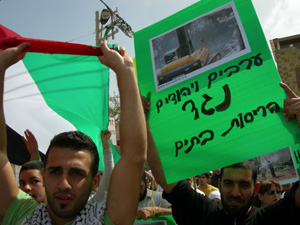 In fact, I should have lost the distance already at Ben Gurion Airport. Security police agents waited for me as soon as I emerged from the sleeve from the Lufthansa plane. They picked me up as the only person from a plane full of passengers. Ritual sets of questions. Irritation. They checked me four times, at every gate, every turn. I think I know why. In December I took part in an ‘Against the Apartheid Road System’ demo and we were all booked there by the Israeli police, our personal details taken down.
In fact, I should have lost the distance already at Ben Gurion Airport. Security police agents waited for me as soon as I emerged from the sleeve from the Lufthansa plane. They picked me up as the only person from a plane full of passengers. Ritual sets of questions. Irritation. They checked me four times, at every gate, every turn. I think I know why. In December I took part in an ‘Against the Apartheid Road System’ demo and we were all booked there by the Israeli police, our personal details taken down. 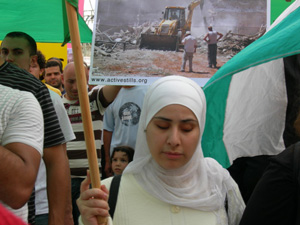 It was Land Day yesterday. In 1976, the Israeli practice of dispossessing Palestinians of their own land in order to set up Jewish settlements there provoked the Arab inhabitants of Galilee to protest. On 30 March 1976, the people of Sakhnin marched in protest against the confiscation by the Israeli Ministry of Defence of a plot of land on the edge of their town. Six of them died in ensuing clashes with the police. Since then, the Israeli Arabs have celebrated an annual Land Day as a symbol of protest against the discriminatory practices of the Israeli government.
It was Land Day yesterday. In 1976, the Israeli practice of dispossessing Palestinians of their own land in order to set up Jewish settlements there provoked the Arab inhabitants of Galilee to protest. On 30 March 1976, the people of Sakhnin marched in protest against the confiscation by the Israeli Ministry of Defence of a plot of land on the edge of their town. Six of them died in ensuing clashes with the police. Since then, the Israeli Arabs have celebrated an annual Land Day as a symbol of protest against the discriminatory practices of the Israeli government. 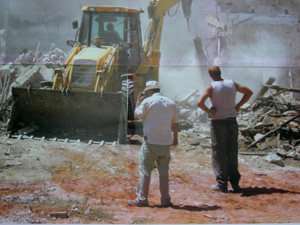 This year, for the first time ever, the demonstration took place in Jaffa, the traditionally Arab part of Tel Aviv, and was bundled with a protest against the eviction of 500 Arab families from this part of town and a ruling in a long-going trial concerning properties attached to the Arab cemetery which, legally but unbeknownst to the Islamic community, were sold in 1973. The Arabs lost the case. Now developers will build elegant condos for the Israeli middle class there.
This year, for the first time ever, the demonstration took place in Jaffa, the traditionally Arab part of Tel Aviv, and was bundled with a protest against the eviction of 500 Arab families from this part of town and a ruling in a long-going trial concerning properties attached to the Arab cemetery which, legally but unbeknownst to the Islamic community, were sold in 1973. The Arabs lost the case. Now developers will build elegant condos for the Israeli middle class there. 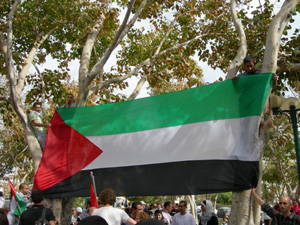 The protest was organised by the Jewish-Arab leftwing party Hadash. Some sources say there were several hundred demonstrators, other ones say two thousand. I think there were less than a thousand people there. Still, it was the most spontaneous street march in which I’ve ever taken part. It was attended not only by Israeli activists of all hues but also by the Arab citizens of Israel who have a double identity, or no identity at all. The Jews treat them as second-rate citizens, the Palestinians think them traitors. It was them who carried a big Palestinian flag like a canopy. There was, in fact, a lot of Palestinian flags, reportedly a new thing. There was also a lot of ‘Allahu akbar’ (‘God is great’) chanting, which didn’t sound peaceful at all. But there are no peaceful demonstrations here anymore. The protest ended with a political picnic on one of the public squares near Nefet Street. Tomorrow I go to Jenin.
The protest was organised by the Jewish-Arab leftwing party Hadash. Some sources say there were several hundred demonstrators, other ones say two thousand. I think there were less than a thousand people there. Still, it was the most spontaneous street march in which I’ve ever taken part. It was attended not only by Israeli activists of all hues but also by the Arab citizens of Israel who have a double identity, or no identity at all. The Jews treat them as second-rate citizens, the Palestinians think them traitors. It was them who carried a big Palestinian flag like a canopy. There was, in fact, a lot of Palestinian flags, reportedly a new thing. There was also a lot of ‘Allahu akbar’ (‘God is great’) chanting, which didn’t sound peaceful at all. But there are no peaceful demonstrations here anymore. The protest ended with a political picnic on one of the public squares near Nefet Street. Tomorrow I go to Jenin.